Personal and Professional Development Plan
VerifiedAdded on 2023/02/02
|20
|5633
|35
AI Summary
This document discusses the concept of personal and professional development and its importance in today's fast-paced world. It explores the approaches of self-managed learning and ways to encourage lifelong learning. It also evaluates the current skills and competencies of an individual and identifies the development needs and activities required to meet them. Finally, it guides the reader on how to devise a personal and professional development plan based on the identified needs.
Contribute Materials
Your contribution can guide someone’s learning journey. Share your
documents today.
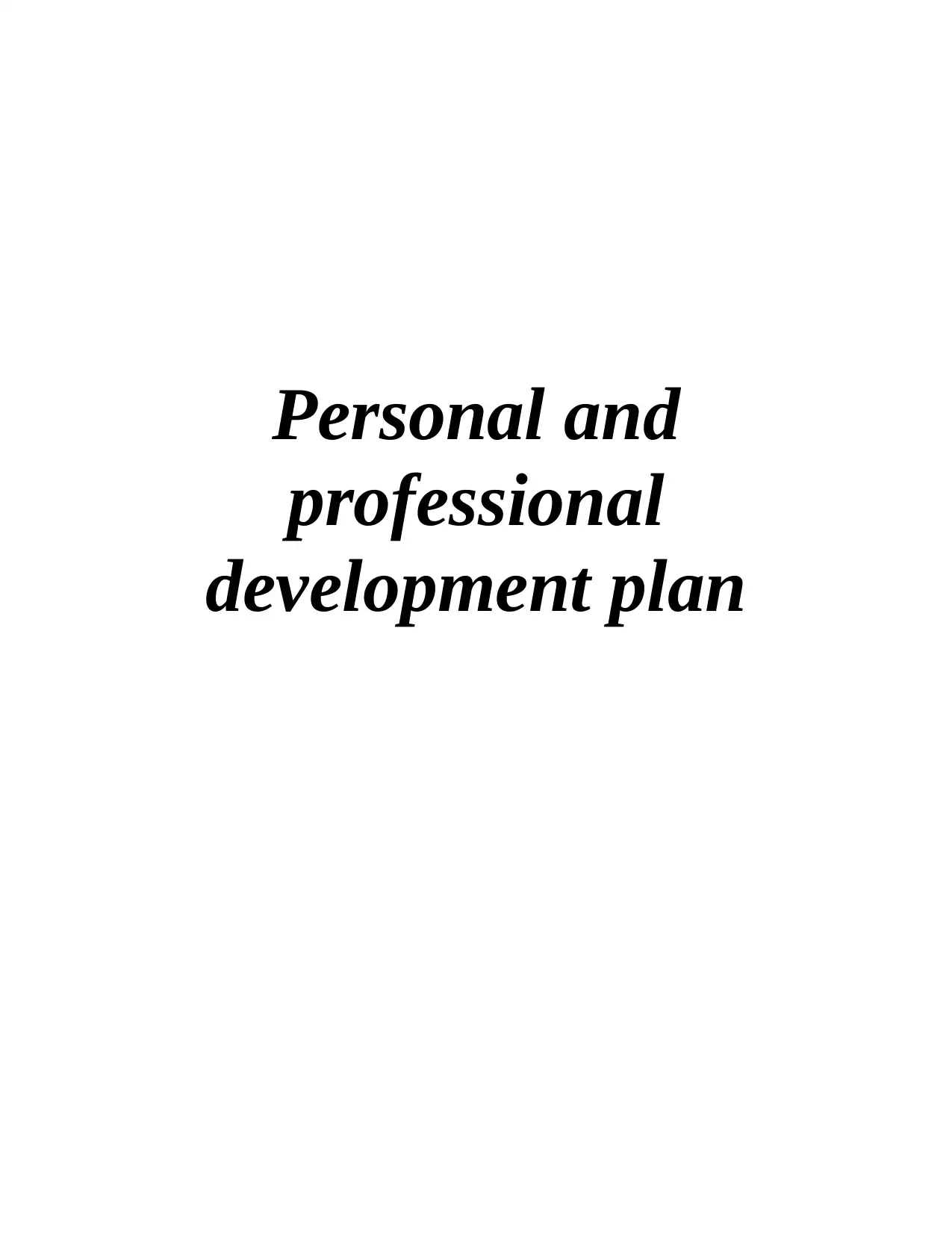
Personal and
professional
development plan
professional
development plan
Secure Best Marks with AI Grader
Need help grading? Try our AI Grader for instant feedback on your assignments.
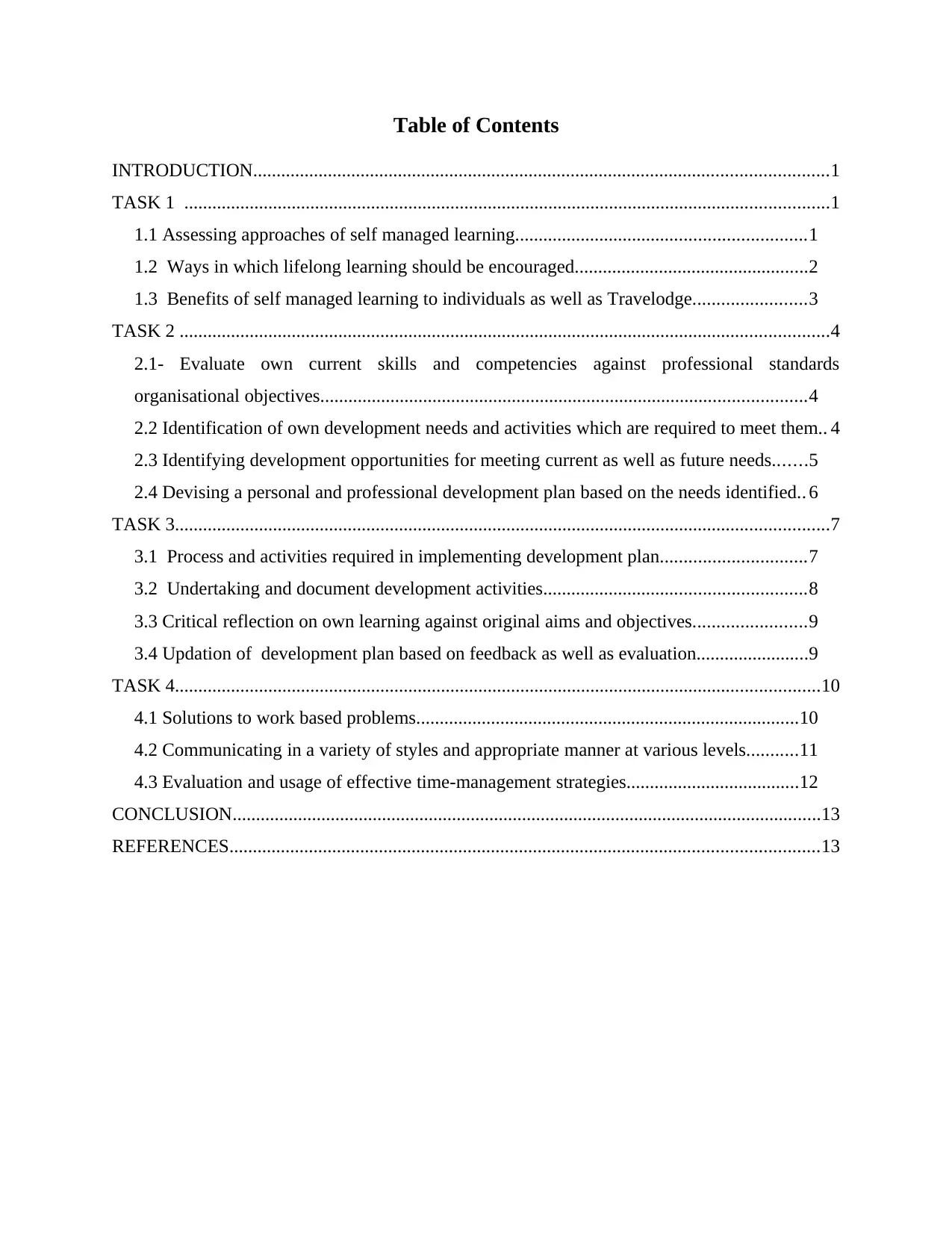
Table of Contents
INTRODUCTION...........................................................................................................................1
TASK 1 ..........................................................................................................................................1
1.1 Assessing approaches of self managed learning..............................................................1
1.2 Ways in which lifelong learning should be encouraged..................................................2
1.3 Benefits of self managed learning to individuals as well as Travelodge........................3
TASK 2 ...........................................................................................................................................4
2.1- Evaluate own current skills and competencies against professional standards
organisational objectives........................................................................................................4
2.2 Identification of own development needs and activities which are required to meet them.. 4
2.3 Identifying development opportunities for meeting current as well as future needs.......5
2.4 Devising a personal and professional development plan based on the needs identified.. 6
TASK 3............................................................................................................................................7
3.1 Process and activities required in implementing development plan...............................7
3.2 Undertaking and document development activities........................................................8
3.3 Critical reflection on own learning against original aims and objectives........................9
3.4 Updation of development plan based on feedback as well as evaluation........................9
TASK 4..........................................................................................................................................10
4.1 Solutions to work based problems..................................................................................10
4.2 Communicating in a variety of styles and appropriate manner at various levels...........11
4.3 Evaluation and usage of effective time-management strategies.....................................12
CONCLUSION..............................................................................................................................13
REFERENCES..............................................................................................................................13
INTRODUCTION...........................................................................................................................1
TASK 1 ..........................................................................................................................................1
1.1 Assessing approaches of self managed learning..............................................................1
1.2 Ways in which lifelong learning should be encouraged..................................................2
1.3 Benefits of self managed learning to individuals as well as Travelodge........................3
TASK 2 ...........................................................................................................................................4
2.1- Evaluate own current skills and competencies against professional standards
organisational objectives........................................................................................................4
2.2 Identification of own development needs and activities which are required to meet them.. 4
2.3 Identifying development opportunities for meeting current as well as future needs.......5
2.4 Devising a personal and professional development plan based on the needs identified.. 6
TASK 3............................................................................................................................................7
3.1 Process and activities required in implementing development plan...............................7
3.2 Undertaking and document development activities........................................................8
3.3 Critical reflection on own learning against original aims and objectives........................9
3.4 Updation of development plan based on feedback as well as evaluation........................9
TASK 4..........................................................................................................................................10
4.1 Solutions to work based problems..................................................................................10
4.2 Communicating in a variety of styles and appropriate manner at various levels...........11
4.3 Evaluation and usage of effective time-management strategies.....................................12
CONCLUSION..............................................................................................................................13
REFERENCES..............................................................................................................................13
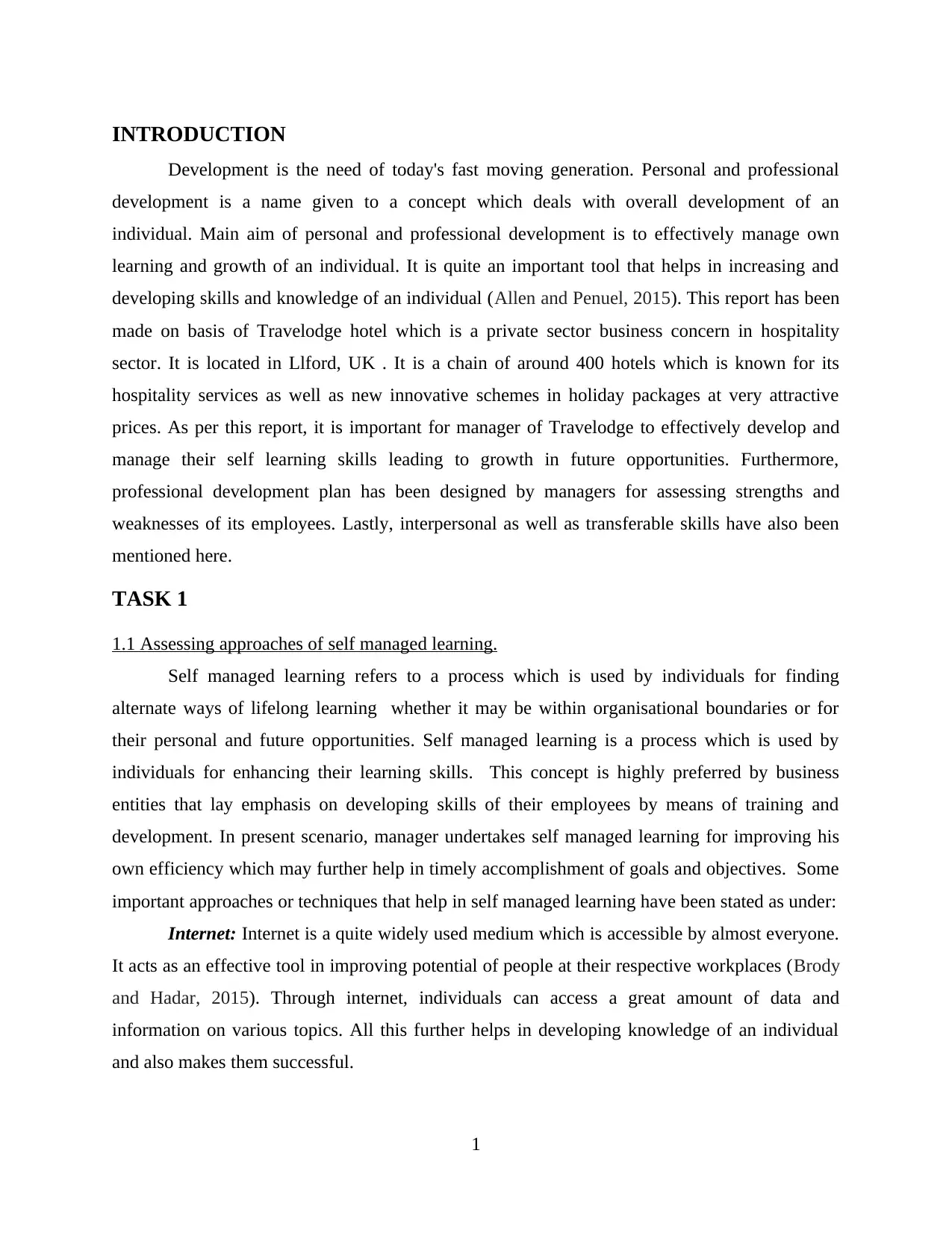
INTRODUCTION
Development is the need of today's fast moving generation. Personal and professional
development is a name given to a concept which deals with overall development of an
individual. Main aim of personal and professional development is to effectively manage own
learning and growth of an individual. It is quite an important tool that helps in increasing and
developing skills and knowledge of an individual (Allen and Penuel, 2015). This report has been
made on basis of Travelodge hotel which is a private sector business concern in hospitality
sector. It is located in Llford, UK . It is a chain of around 400 hotels which is known for its
hospitality services as well as new innovative schemes in holiday packages at very attractive
prices. As per this report, it is important for manager of Travelodge to effectively develop and
manage their self learning skills leading to growth in future opportunities. Furthermore,
professional development plan has been designed by managers for assessing strengths and
weaknesses of its employees. Lastly, interpersonal as well as transferable skills have also been
mentioned here.
TASK 1
1.1 Assessing approaches of self managed learning.
Self managed learning refers to a process which is used by individuals for finding
alternate ways of lifelong learning whether it may be within organisational boundaries or for
their personal and future opportunities. Self managed learning is a process which is used by
individuals for enhancing their learning skills. This concept is highly preferred by business
entities that lay emphasis on developing skills of their employees by means of training and
development. In present scenario, manager undertakes self managed learning for improving his
own efficiency which may further help in timely accomplishment of goals and objectives. Some
important approaches or techniques that help in self managed learning have been stated as under:
Internet: Internet is a quite widely used medium which is accessible by almost everyone.
It acts as an effective tool in improving potential of people at their respective workplaces (Brody
and Hadar, 2015). Through internet, individuals can access a great amount of data and
information on various topics. All this further helps in developing knowledge of an individual
and also makes them successful.
1
Development is the need of today's fast moving generation. Personal and professional
development is a name given to a concept which deals with overall development of an
individual. Main aim of personal and professional development is to effectively manage own
learning and growth of an individual. It is quite an important tool that helps in increasing and
developing skills and knowledge of an individual (Allen and Penuel, 2015). This report has been
made on basis of Travelodge hotel which is a private sector business concern in hospitality
sector. It is located in Llford, UK . It is a chain of around 400 hotels which is known for its
hospitality services as well as new innovative schemes in holiday packages at very attractive
prices. As per this report, it is important for manager of Travelodge to effectively develop and
manage their self learning skills leading to growth in future opportunities. Furthermore,
professional development plan has been designed by managers for assessing strengths and
weaknesses of its employees. Lastly, interpersonal as well as transferable skills have also been
mentioned here.
TASK 1
1.1 Assessing approaches of self managed learning.
Self managed learning refers to a process which is used by individuals for finding
alternate ways of lifelong learning whether it may be within organisational boundaries or for
their personal and future opportunities. Self managed learning is a process which is used by
individuals for enhancing their learning skills. This concept is highly preferred by business
entities that lay emphasis on developing skills of their employees by means of training and
development. In present scenario, manager undertakes self managed learning for improving his
own efficiency which may further help in timely accomplishment of goals and objectives. Some
important approaches or techniques that help in self managed learning have been stated as under:
Internet: Internet is a quite widely used medium which is accessible by almost everyone.
It acts as an effective tool in improving potential of people at their respective workplaces (Brody
and Hadar, 2015). Through internet, individuals can access a great amount of data and
information on various topics. All this further helps in developing knowledge of an individual
and also makes them successful.
1
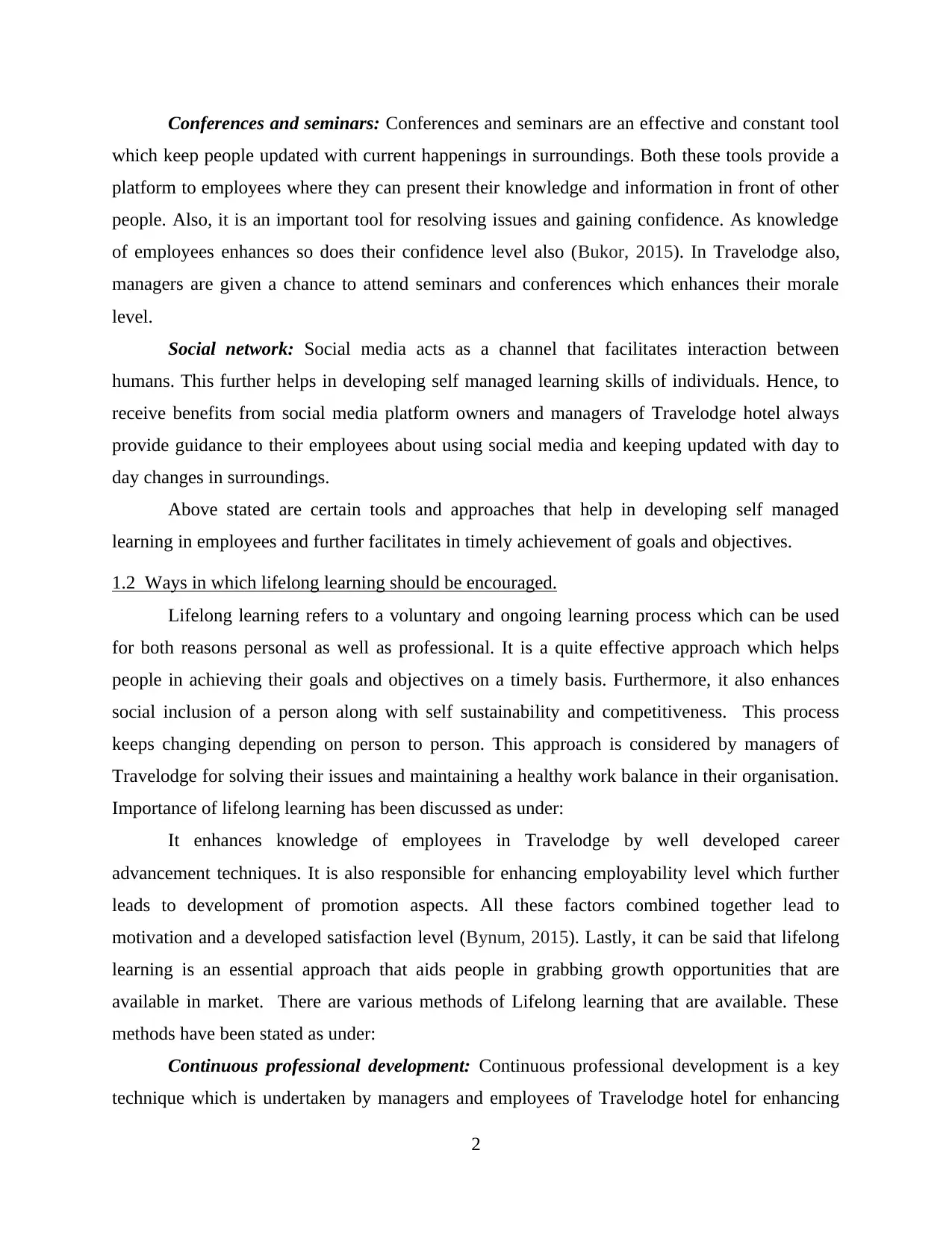
Conferences and seminars: Conferences and seminars are an effective and constant tool
which keep people updated with current happenings in surroundings. Both these tools provide a
platform to employees where they can present their knowledge and information in front of other
people. Also, it is an important tool for resolving issues and gaining confidence. As knowledge
of employees enhances so does their confidence level also (Bukor, 2015). In Travelodge also,
managers are given a chance to attend seminars and conferences which enhances their morale
level.
Social network: Social media acts as a channel that facilitates interaction between
humans. This further helps in developing self managed learning skills of individuals. Hence, to
receive benefits from social media platform owners and managers of Travelodge hotel always
provide guidance to their employees about using social media and keeping updated with day to
day changes in surroundings.
Above stated are certain tools and approaches that help in developing self managed
learning in employees and further facilitates in timely achievement of goals and objectives.
1.2 Ways in which lifelong learning should be encouraged.
Lifelong learning refers to a voluntary and ongoing learning process which can be used
for both reasons personal as well as professional. It is a quite effective approach which helps
people in achieving their goals and objectives on a timely basis. Furthermore, it also enhances
social inclusion of a person along with self sustainability and competitiveness. This process
keeps changing depending on person to person. This approach is considered by managers of
Travelodge for solving their issues and maintaining a healthy work balance in their organisation.
Importance of lifelong learning has been discussed as under:
It enhances knowledge of employees in Travelodge by well developed career
advancement techniques. It is also responsible for enhancing employability level which further
leads to development of promotion aspects. All these factors combined together lead to
motivation and a developed satisfaction level (Bynum, 2015). Lastly, it can be said that lifelong
learning is an essential approach that aids people in grabbing growth opportunities that are
available in market. There are various methods of Lifelong learning that are available. These
methods have been stated as under:
Continuous professional development: Continuous professional development is a key
technique which is undertaken by managers and employees of Travelodge hotel for enhancing
2
which keep people updated with current happenings in surroundings. Both these tools provide a
platform to employees where they can present their knowledge and information in front of other
people. Also, it is an important tool for resolving issues and gaining confidence. As knowledge
of employees enhances so does their confidence level also (Bukor, 2015). In Travelodge also,
managers are given a chance to attend seminars and conferences which enhances their morale
level.
Social network: Social media acts as a channel that facilitates interaction between
humans. This further helps in developing self managed learning skills of individuals. Hence, to
receive benefits from social media platform owners and managers of Travelodge hotel always
provide guidance to their employees about using social media and keeping updated with day to
day changes in surroundings.
Above stated are certain tools and approaches that help in developing self managed
learning in employees and further facilitates in timely achievement of goals and objectives.
1.2 Ways in which lifelong learning should be encouraged.
Lifelong learning refers to a voluntary and ongoing learning process which can be used
for both reasons personal as well as professional. It is a quite effective approach which helps
people in achieving their goals and objectives on a timely basis. Furthermore, it also enhances
social inclusion of a person along with self sustainability and competitiveness. This process
keeps changing depending on person to person. This approach is considered by managers of
Travelodge for solving their issues and maintaining a healthy work balance in their organisation.
Importance of lifelong learning has been discussed as under:
It enhances knowledge of employees in Travelodge by well developed career
advancement techniques. It is also responsible for enhancing employability level which further
leads to development of promotion aspects. All these factors combined together lead to
motivation and a developed satisfaction level (Bynum, 2015). Lastly, it can be said that lifelong
learning is an essential approach that aids people in grabbing growth opportunities that are
available in market. There are various methods of Lifelong learning that are available. These
methods have been stated as under:
Continuous professional development: Continuous professional development is a key
technique which is undertaken by managers and employees of Travelodge hotel for enhancing
2
Secure Best Marks with AI Grader
Need help grading? Try our AI Grader for instant feedback on your assignments.
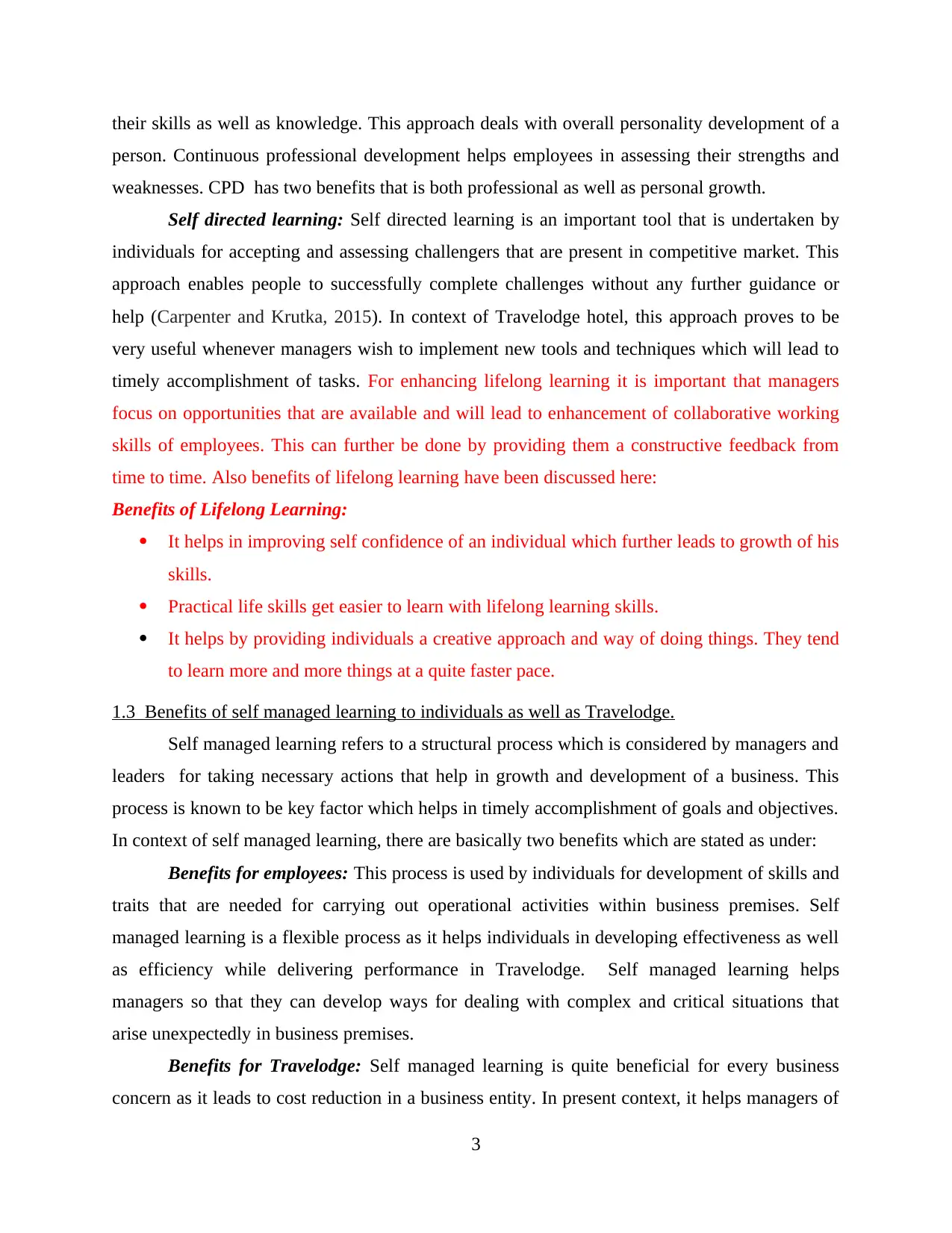
their skills as well as knowledge. This approach deals with overall personality development of a
person. Continuous professional development helps employees in assessing their strengths and
weaknesses. CPD has two benefits that is both professional as well as personal growth.
Self directed learning: Self directed learning is an important tool that is undertaken by
individuals for accepting and assessing challengers that are present in competitive market. This
approach enables people to successfully complete challenges without any further guidance or
help (Carpenter and Krutka, 2015). In context of Travelodge hotel, this approach proves to be
very useful whenever managers wish to implement new tools and techniques which will lead to
timely accomplishment of tasks. For enhancing lifelong learning it is important that managers
focus on opportunities that are available and will lead to enhancement of collaborative working
skills of employees. This can further be done by providing them a constructive feedback from
time to time. Also benefits of lifelong learning have been discussed here:
Benefits of Lifelong Learning:
It helps in improving self confidence of an individual which further leads to growth of his
skills.
Practical life skills get easier to learn with lifelong learning skills.
It helps by providing individuals a creative approach and way of doing things. They tend
to learn more and more things at a quite faster pace.
1.3 Benefits of self managed learning to individuals as well as Travelodge.
Self managed learning refers to a structural process which is considered by managers and
leaders for taking necessary actions that help in growth and development of a business. This
process is known to be key factor which helps in timely accomplishment of goals and objectives.
In context of self managed learning, there are basically two benefits which are stated as under:
Benefits for employees: This process is used by individuals for development of skills and
traits that are needed for carrying out operational activities within business premises. Self
managed learning is a flexible process as it helps individuals in developing effectiveness as well
as efficiency while delivering performance in Travelodge. Self managed learning helps
managers so that they can develop ways for dealing with complex and critical situations that
arise unexpectedly in business premises.
Benefits for Travelodge: Self managed learning is quite beneficial for every business
concern as it leads to cost reduction in a business entity. In present context, it helps managers of
3
person. Continuous professional development helps employees in assessing their strengths and
weaknesses. CPD has two benefits that is both professional as well as personal growth.
Self directed learning: Self directed learning is an important tool that is undertaken by
individuals for accepting and assessing challengers that are present in competitive market. This
approach enables people to successfully complete challenges without any further guidance or
help (Carpenter and Krutka, 2015). In context of Travelodge hotel, this approach proves to be
very useful whenever managers wish to implement new tools and techniques which will lead to
timely accomplishment of tasks. For enhancing lifelong learning it is important that managers
focus on opportunities that are available and will lead to enhancement of collaborative working
skills of employees. This can further be done by providing them a constructive feedback from
time to time. Also benefits of lifelong learning have been discussed here:
Benefits of Lifelong Learning:
It helps in improving self confidence of an individual which further leads to growth of his
skills.
Practical life skills get easier to learn with lifelong learning skills.
It helps by providing individuals a creative approach and way of doing things. They tend
to learn more and more things at a quite faster pace.
1.3 Benefits of self managed learning to individuals as well as Travelodge.
Self managed learning refers to a structural process which is considered by managers and
leaders for taking necessary actions that help in growth and development of a business. This
process is known to be key factor which helps in timely accomplishment of goals and objectives.
In context of self managed learning, there are basically two benefits which are stated as under:
Benefits for employees: This process is used by individuals for development of skills and
traits that are needed for carrying out operational activities within business premises. Self
managed learning is a flexible process as it helps individuals in developing effectiveness as well
as efficiency while delivering performance in Travelodge. Self managed learning helps
managers so that they can develop ways for dealing with complex and critical situations that
arise unexpectedly in business premises.
Benefits for Travelodge: Self managed learning is quite beneficial for every business
concern as it leads to cost reduction in a business entity. In present context, it helps managers of
3
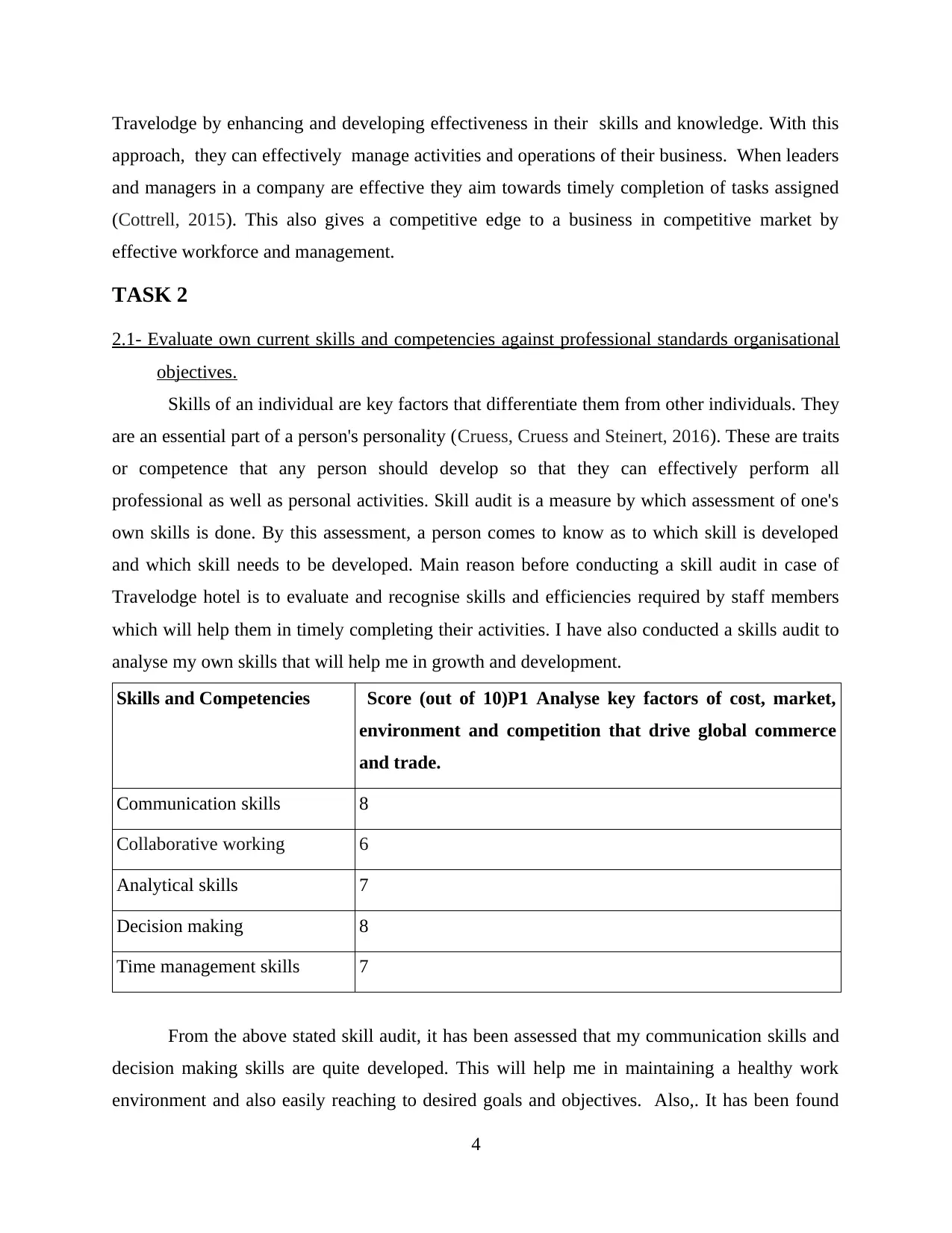
Travelodge by enhancing and developing effectiveness in their skills and knowledge. With this
approach, they can effectively manage activities and operations of their business. When leaders
and managers in a company are effective they aim towards timely completion of tasks assigned
(Cottrell, 2015). This also gives a competitive edge to a business in competitive market by
effective workforce and management.
TASK 2
2.1- Evaluate own current skills and competencies against professional standards organisational
objectives.
Skills of an individual are key factors that differentiate them from other individuals. They
are an essential part of a person's personality (Cruess, Cruess and Steinert, 2016). These are traits
or competence that any person should develop so that they can effectively perform all
professional as well as personal activities. Skill audit is a measure by which assessment of one's
own skills is done. By this assessment, a person comes to know as to which skill is developed
and which skill needs to be developed. Main reason before conducting a skill audit in case of
Travelodge hotel is to evaluate and recognise skills and efficiencies required by staff members
which will help them in timely completing their activities. I have also conducted a skills audit to
analyse my own skills that will help me in growth and development.
Skills and Competencies Score (out of 10)P1 Analyse key factors of cost, market,
environment and competition that drive global commerce
and trade.
Communication skills 8
Collaborative working 6
Analytical skills 7
Decision making 8
Time management skills 7
From the above stated skill audit, it has been assessed that my communication skills and
decision making skills are quite developed. This will help me in maintaining a healthy work
environment and also easily reaching to desired goals and objectives. Also,. It has been found
4
approach, they can effectively manage activities and operations of their business. When leaders
and managers in a company are effective they aim towards timely completion of tasks assigned
(Cottrell, 2015). This also gives a competitive edge to a business in competitive market by
effective workforce and management.
TASK 2
2.1- Evaluate own current skills and competencies against professional standards organisational
objectives.
Skills of an individual are key factors that differentiate them from other individuals. They
are an essential part of a person's personality (Cruess, Cruess and Steinert, 2016). These are traits
or competence that any person should develop so that they can effectively perform all
professional as well as personal activities. Skill audit is a measure by which assessment of one's
own skills is done. By this assessment, a person comes to know as to which skill is developed
and which skill needs to be developed. Main reason before conducting a skill audit in case of
Travelodge hotel is to evaluate and recognise skills and efficiencies required by staff members
which will help them in timely completing their activities. I have also conducted a skills audit to
analyse my own skills that will help me in growth and development.
Skills and Competencies Score (out of 10)P1 Analyse key factors of cost, market,
environment and competition that drive global commerce
and trade.
Communication skills 8
Collaborative working 6
Analytical skills 7
Decision making 8
Time management skills 7
From the above stated skill audit, it has been assessed that my communication skills and
decision making skills are quite developed. This will help me in maintaining a healthy work
environment and also easily reaching to desired goals and objectives. Also,. It has been found
4
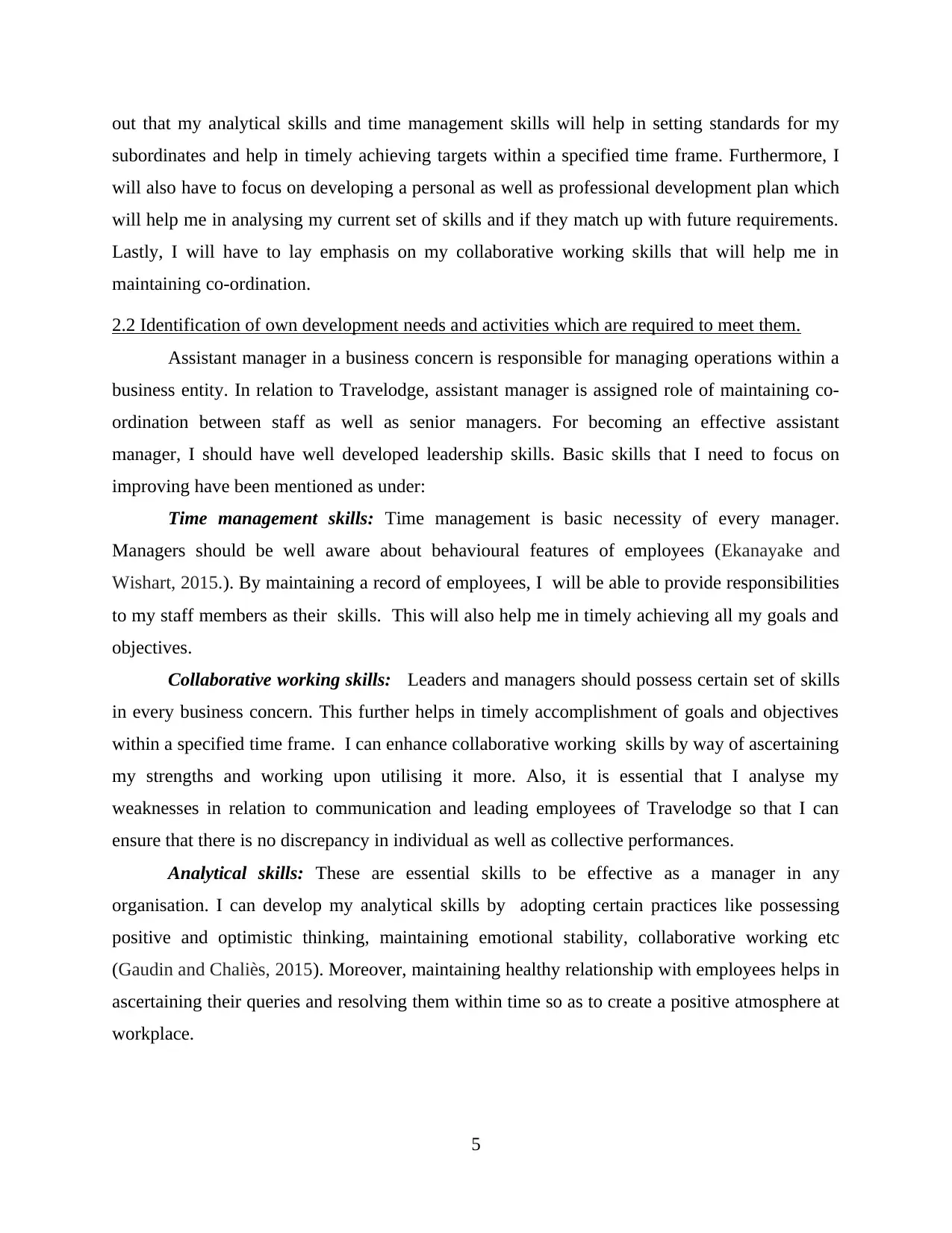
out that my analytical skills and time management skills will help in setting standards for my
subordinates and help in timely achieving targets within a specified time frame. Furthermore, I
will also have to focus on developing a personal as well as professional development plan which
will help me in analysing my current set of skills and if they match up with future requirements.
Lastly, I will have to lay emphasis on my collaborative working skills that will help me in
maintaining co-ordination.
2.2 Identification of own development needs and activities which are required to meet them.
Assistant manager in a business concern is responsible for managing operations within a
business entity. In relation to Travelodge, assistant manager is assigned role of maintaining co-
ordination between staff as well as senior managers. For becoming an effective assistant
manager, I should have well developed leadership skills. Basic skills that I need to focus on
improving have been mentioned as under:
Time management skills: Time management is basic necessity of every manager.
Managers should be well aware about behavioural features of employees (Ekanayake and
Wishart, 2015.). By maintaining a record of employees, I will be able to provide responsibilities
to my staff members as their skills. This will also help me in timely achieving all my goals and
objectives.
Collaborative working skills: Leaders and managers should possess certain set of skills
in every business concern. This further helps in timely accomplishment of goals and objectives
within a specified time frame. I can enhance collaborative working skills by way of ascertaining
my strengths and working upon utilising it more. Also, it is essential that I analyse my
weaknesses in relation to communication and leading employees of Travelodge so that I can
ensure that there is no discrepancy in individual as well as collective performances.
Analytical skills: These are essential skills to be effective as a manager in any
organisation. I can develop my analytical skills by adopting certain practices like possessing
positive and optimistic thinking, maintaining emotional stability, collaborative working etc
(Gaudin and Chaliès, 2015). Moreover, maintaining healthy relationship with employees helps in
ascertaining their queries and resolving them within time so as to create a positive atmosphere at
workplace.
5
subordinates and help in timely achieving targets within a specified time frame. Furthermore, I
will also have to focus on developing a personal as well as professional development plan which
will help me in analysing my current set of skills and if they match up with future requirements.
Lastly, I will have to lay emphasis on my collaborative working skills that will help me in
maintaining co-ordination.
2.2 Identification of own development needs and activities which are required to meet them.
Assistant manager in a business concern is responsible for managing operations within a
business entity. In relation to Travelodge, assistant manager is assigned role of maintaining co-
ordination between staff as well as senior managers. For becoming an effective assistant
manager, I should have well developed leadership skills. Basic skills that I need to focus on
improving have been mentioned as under:
Time management skills: Time management is basic necessity of every manager.
Managers should be well aware about behavioural features of employees (Ekanayake and
Wishart, 2015.). By maintaining a record of employees, I will be able to provide responsibilities
to my staff members as their skills. This will also help me in timely achieving all my goals and
objectives.
Collaborative working skills: Leaders and managers should possess certain set of skills
in every business concern. This further helps in timely accomplishment of goals and objectives
within a specified time frame. I can enhance collaborative working skills by way of ascertaining
my strengths and working upon utilising it more. Also, it is essential that I analyse my
weaknesses in relation to communication and leading employees of Travelodge so that I can
ensure that there is no discrepancy in individual as well as collective performances.
Analytical skills: These are essential skills to be effective as a manager in any
organisation. I can develop my analytical skills by adopting certain practices like possessing
positive and optimistic thinking, maintaining emotional stability, collaborative working etc
(Gaudin and Chaliès, 2015). Moreover, maintaining healthy relationship with employees helps in
ascertaining their queries and resolving them within time so as to create a positive atmosphere at
workplace.
5
Paraphrase This Document
Need a fresh take? Get an instant paraphrase of this document with our AI Paraphraser
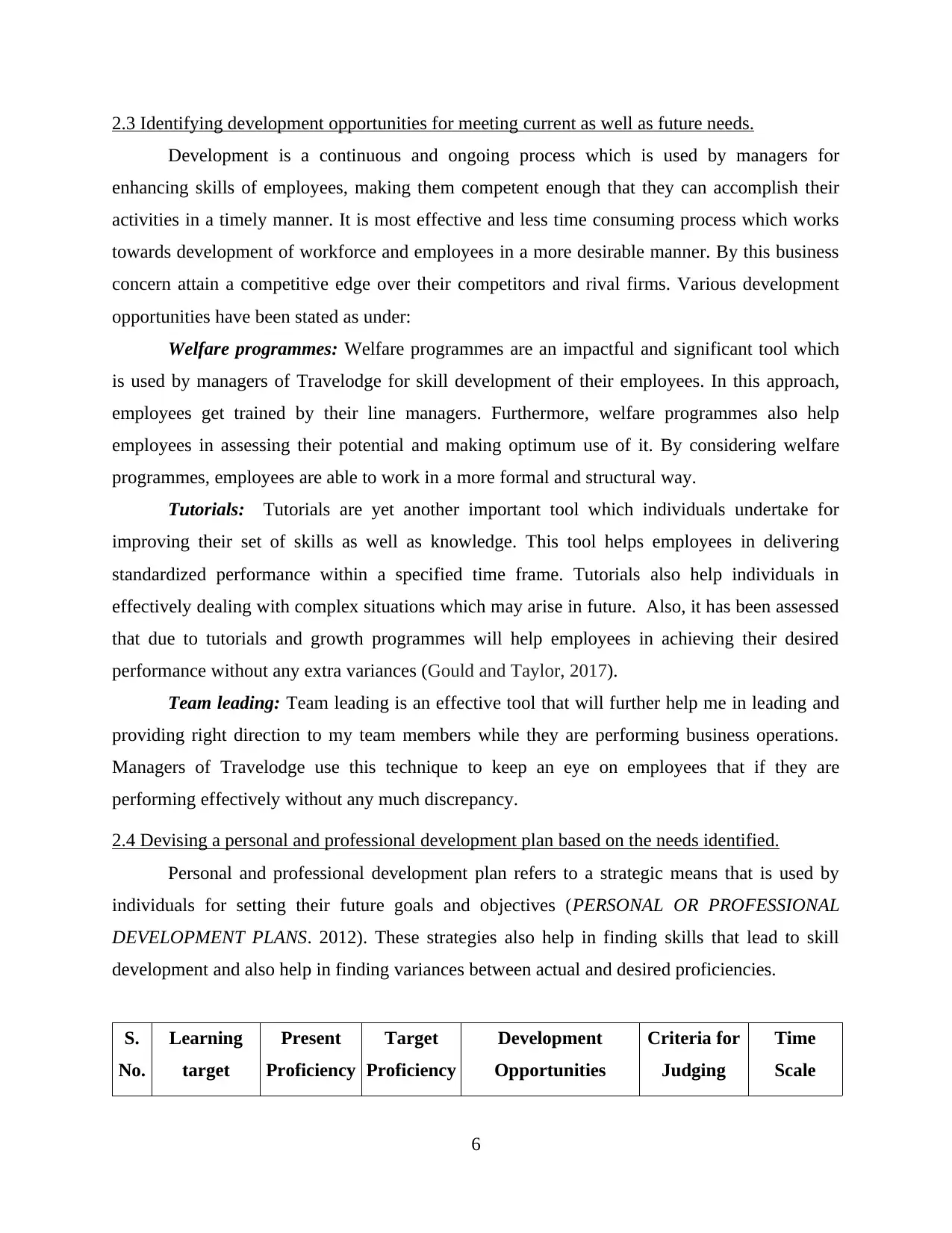
2.3 Identifying development opportunities for meeting current as well as future needs.
Development is a continuous and ongoing process which is used by managers for
enhancing skills of employees, making them competent enough that they can accomplish their
activities in a timely manner. It is most effective and less time consuming process which works
towards development of workforce and employees in a more desirable manner. By this business
concern attain a competitive edge over their competitors and rival firms. Various development
opportunities have been stated as under:
Welfare programmes: Welfare programmes are an impactful and significant tool which
is used by managers of Travelodge for skill development of their employees. In this approach,
employees get trained by their line managers. Furthermore, welfare programmes also help
employees in assessing their potential and making optimum use of it. By considering welfare
programmes, employees are able to work in a more formal and structural way.
Tutorials: Tutorials are yet another important tool which individuals undertake for
improving their set of skills as well as knowledge. This tool helps employees in delivering
standardized performance within a specified time frame. Tutorials also help individuals in
effectively dealing with complex situations which may arise in future. Also, it has been assessed
that due to tutorials and growth programmes will help employees in achieving their desired
performance without any extra variances (Gould and Taylor, 2017).
Team leading: Team leading is an effective tool that will further help me in leading and
providing right direction to my team members while they are performing business operations.
Managers of Travelodge use this technique to keep an eye on employees that if they are
performing effectively without any much discrepancy.
2.4 Devising a personal and professional development plan based on the needs identified.
Personal and professional development plan refers to a strategic means that is used by
individuals for setting their future goals and objectives (PERSONAL OR PROFESSIONAL
DEVELOPMENT PLANS. 2012). These strategies also help in finding skills that lead to skill
development and also help in finding variances between actual and desired proficiencies.
S.
No.
Learning
target
Present
Proficiency
Target
Proficiency
Development
Opportunities
Criteria for
Judging
Time
Scale
6
Development is a continuous and ongoing process which is used by managers for
enhancing skills of employees, making them competent enough that they can accomplish their
activities in a timely manner. It is most effective and less time consuming process which works
towards development of workforce and employees in a more desirable manner. By this business
concern attain a competitive edge over their competitors and rival firms. Various development
opportunities have been stated as under:
Welfare programmes: Welfare programmes are an impactful and significant tool which
is used by managers of Travelodge for skill development of their employees. In this approach,
employees get trained by their line managers. Furthermore, welfare programmes also help
employees in assessing their potential and making optimum use of it. By considering welfare
programmes, employees are able to work in a more formal and structural way.
Tutorials: Tutorials are yet another important tool which individuals undertake for
improving their set of skills as well as knowledge. This tool helps employees in delivering
standardized performance within a specified time frame. Tutorials also help individuals in
effectively dealing with complex situations which may arise in future. Also, it has been assessed
that due to tutorials and growth programmes will help employees in achieving their desired
performance without any extra variances (Gould and Taylor, 2017).
Team leading: Team leading is an effective tool that will further help me in leading and
providing right direction to my team members while they are performing business operations.
Managers of Travelodge use this technique to keep an eye on employees that if they are
performing effectively without any much discrepancy.
2.4 Devising a personal and professional development plan based on the needs identified.
Personal and professional development plan refers to a strategic means that is used by
individuals for setting their future goals and objectives (PERSONAL OR PROFESSIONAL
DEVELOPMENT PLANS. 2012). These strategies also help in finding skills that lead to skill
development and also help in finding variances between actual and desired proficiencies.
S.
No.
Learning
target
Present
Proficiency
Target
Proficiency
Development
Opportunities
Criteria for
Judging
Time
Scale
6
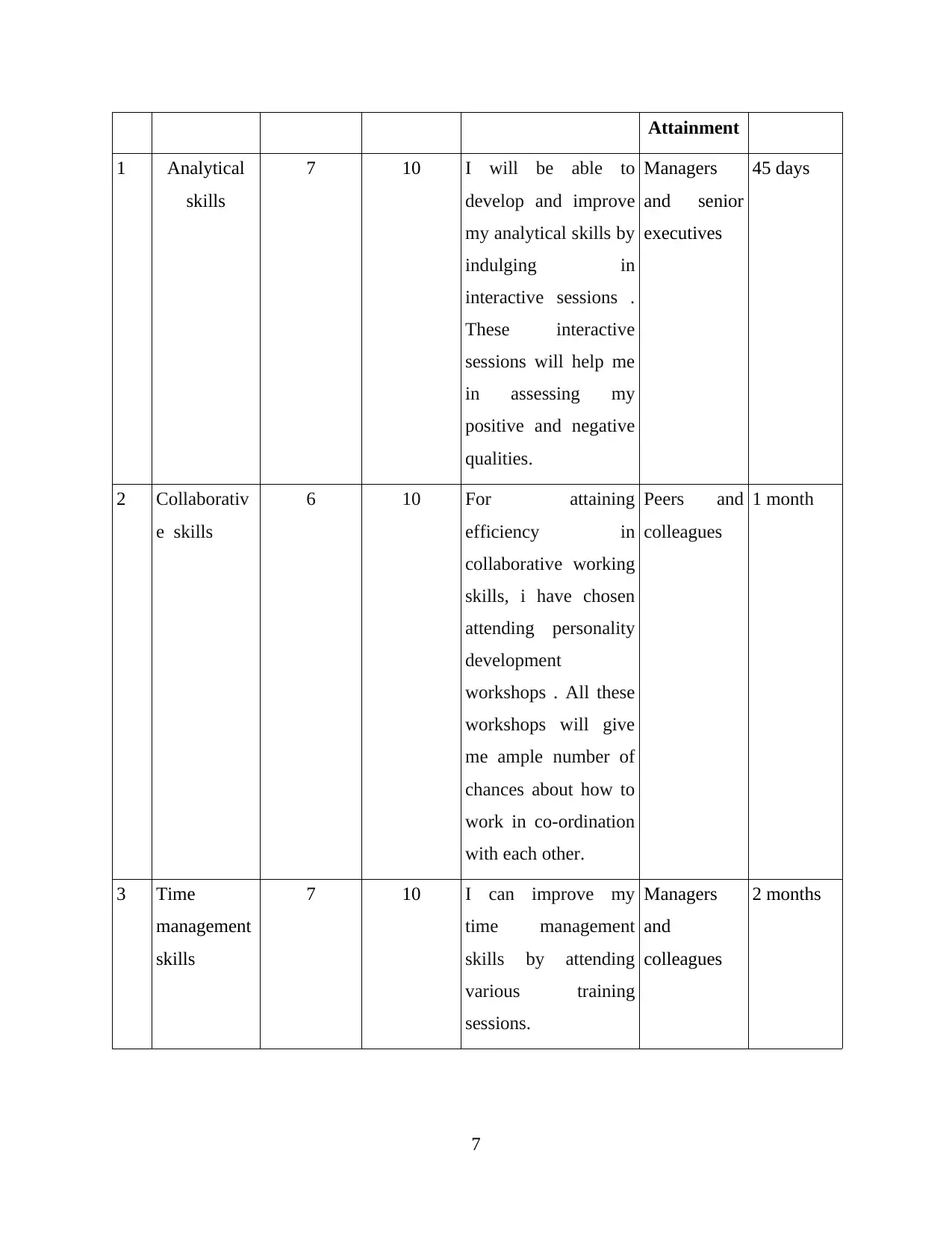
Attainment
1 Analytical
skills
7 10 I will be able to
develop and improve
my analytical skills by
indulging in
interactive sessions .
These interactive
sessions will help me
in assessing my
positive and negative
qualities.
Managers
and senior
executives
45 days
2 Collaborativ
e skills
6 10 For attaining
efficiency in
collaborative working
skills, i have chosen
attending personality
development
workshops . All these
workshops will give
me ample number of
chances about how to
work in co-ordination
with each other.
Peers and
colleagues
1 month
3 Time
management
skills
7 10 I can improve my
time management
skills by attending
various training
sessions.
Managers
and
colleagues
2 months
7
1 Analytical
skills
7 10 I will be able to
develop and improve
my analytical skills by
indulging in
interactive sessions .
These interactive
sessions will help me
in assessing my
positive and negative
qualities.
Managers
and senior
executives
45 days
2 Collaborativ
e skills
6 10 For attaining
efficiency in
collaborative working
skills, i have chosen
attending personality
development
workshops . All these
workshops will give
me ample number of
chances about how to
work in co-ordination
with each other.
Peers and
colleagues
1 month
3 Time
management
skills
7 10 I can improve my
time management
skills by attending
various training
sessions.
Managers
and
colleagues
2 months
7
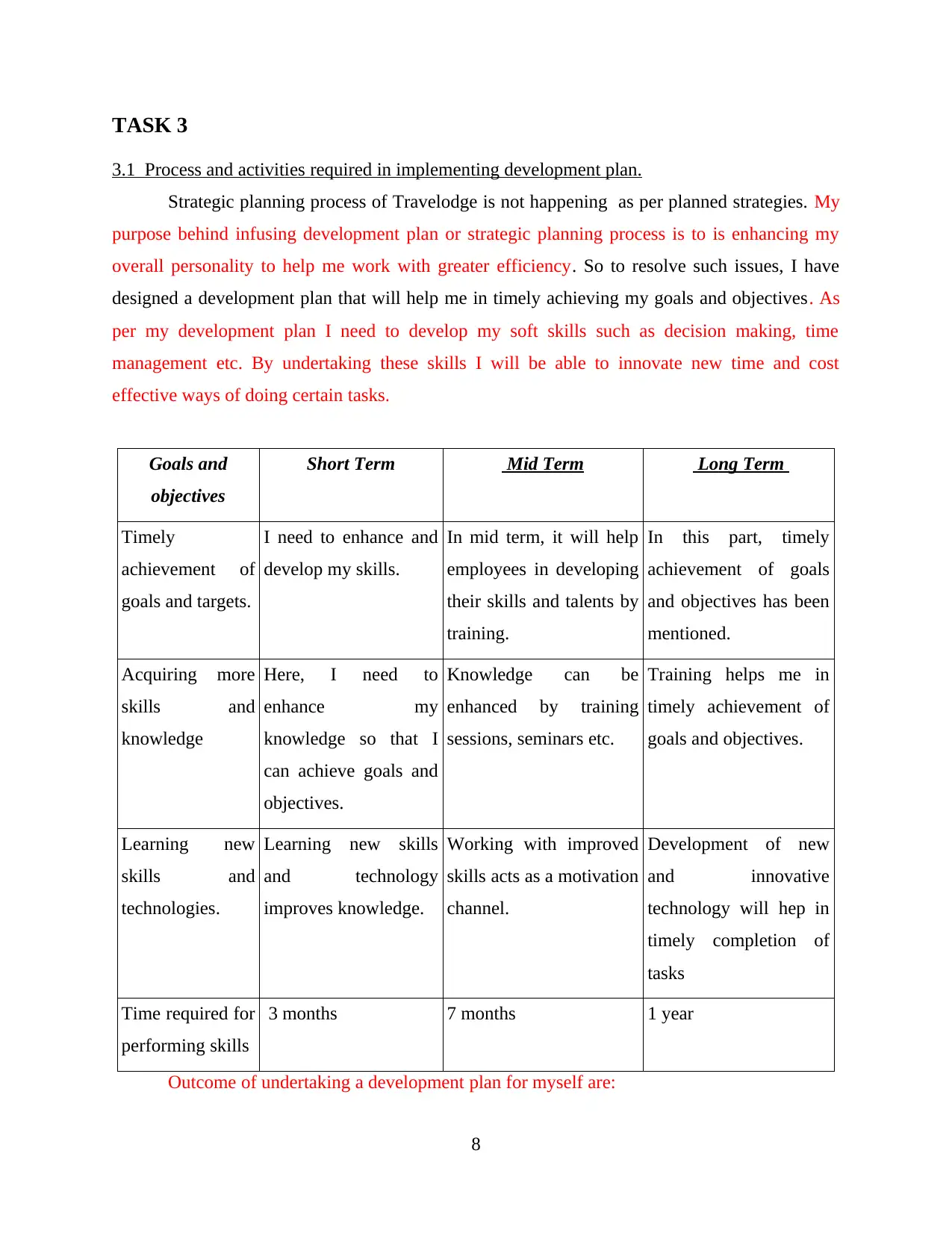
TASK 3
3.1 Process and activities required in implementing development plan.
Strategic planning process of Travelodge is not happening as per planned strategies. My
purpose behind infusing development plan or strategic planning process is to is enhancing my
overall personality to help me work with greater efficiency. So to resolve such issues, I have
designed a development plan that will help me in timely achieving my goals and objectives. As
per my development plan I need to develop my soft skills such as decision making, time
management etc. By undertaking these skills I will be able to innovate new time and cost
effective ways of doing certain tasks.
Goals and
objectives
Short Term Mid Term Long Term
Timely
achievement of
goals and targets.
I need to enhance and
develop my skills.
In mid term, it will help
employees in developing
their skills and talents by
training.
In this part, timely
achievement of goals
and objectives has been
mentioned.
Acquiring more
skills and
knowledge
Here, I need to
enhance my
knowledge so that I
can achieve goals and
objectives.
Knowledge can be
enhanced by training
sessions, seminars etc.
Training helps me in
timely achievement of
goals and objectives.
Learning new
skills and
technologies.
Learning new skills
and technology
improves knowledge.
Working with improved
skills acts as a motivation
channel.
Development of new
and innovative
technology will hep in
timely completion of
tasks
Time required for
performing skills
3 months 7 months 1 year
Outcome of undertaking a development plan for myself are:
8
3.1 Process and activities required in implementing development plan.
Strategic planning process of Travelodge is not happening as per planned strategies. My
purpose behind infusing development plan or strategic planning process is to is enhancing my
overall personality to help me work with greater efficiency. So to resolve such issues, I have
designed a development plan that will help me in timely achieving my goals and objectives. As
per my development plan I need to develop my soft skills such as decision making, time
management etc. By undertaking these skills I will be able to innovate new time and cost
effective ways of doing certain tasks.
Goals and
objectives
Short Term Mid Term Long Term
Timely
achievement of
goals and targets.
I need to enhance and
develop my skills.
In mid term, it will help
employees in developing
their skills and talents by
training.
In this part, timely
achievement of goals
and objectives has been
mentioned.
Acquiring more
skills and
knowledge
Here, I need to
enhance my
knowledge so that I
can achieve goals and
objectives.
Knowledge can be
enhanced by training
sessions, seminars etc.
Training helps me in
timely achievement of
goals and objectives.
Learning new
skills and
technologies.
Learning new skills
and technology
improves knowledge.
Working with improved
skills acts as a motivation
channel.
Development of new
and innovative
technology will hep in
timely completion of
tasks
Time required for
performing skills
3 months 7 months 1 year
Outcome of undertaking a development plan for myself are:
8
Secure Best Marks with AI Grader
Need help grading? Try our AI Grader for instant feedback on your assignments.
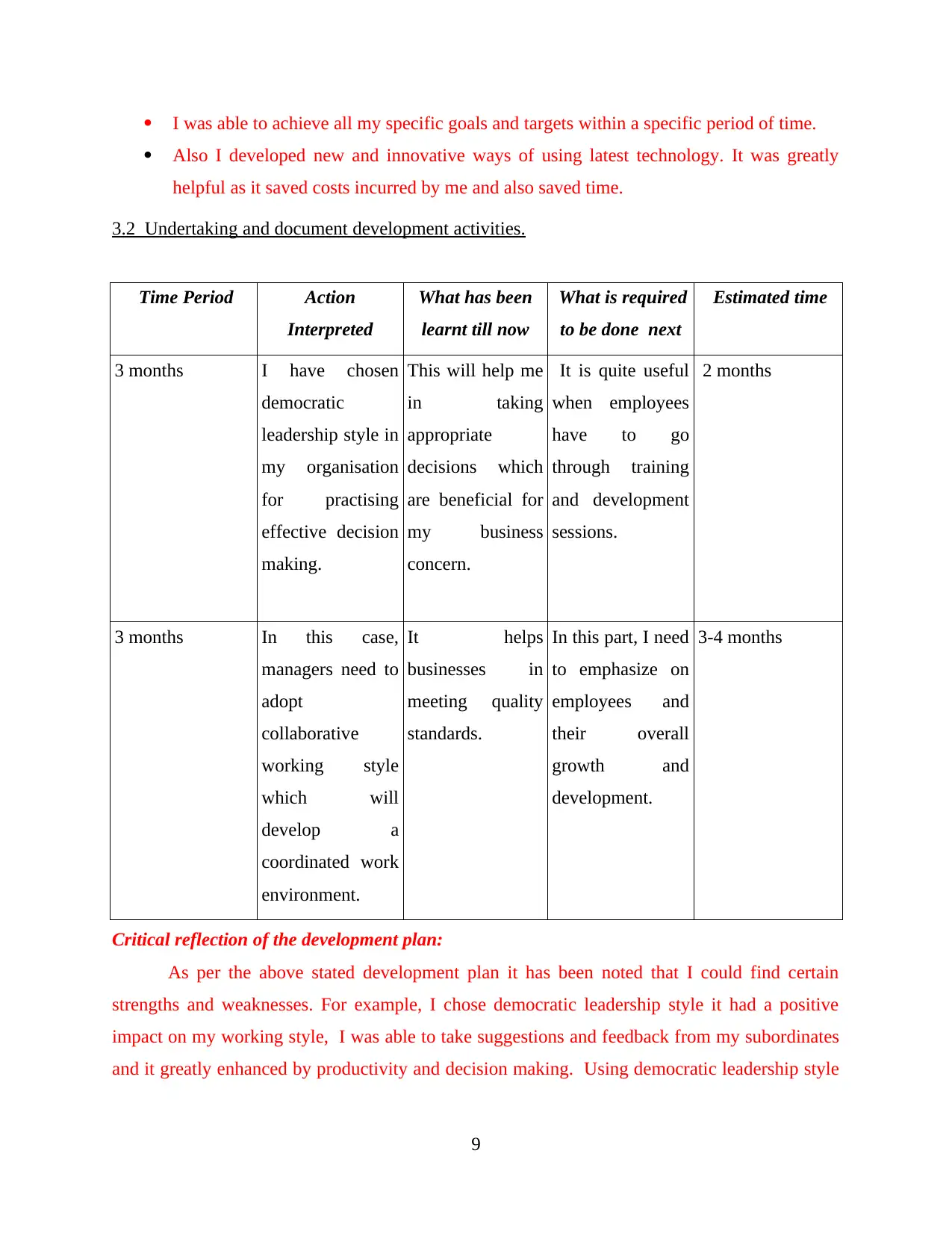
I was able to achieve all my specific goals and targets within a specific period of time.
Also I developed new and innovative ways of using latest technology. It was greatly
helpful as it saved costs incurred by me and also saved time.
3.2 Undertaking and document development activities.
Time Period Action
Interpreted
What has been
learnt till now
What is required
to be done next
Estimated time
3 months I have chosen
democratic
leadership style in
my organisation
for practising
effective decision
making.
This will help me
in taking
appropriate
decisions which
are beneficial for
my business
concern.
It is quite useful
when employees
have to go
through training
and development
sessions.
2 months
3 months In this case,
managers need to
adopt
collaborative
working style
which will
develop a
coordinated work
environment.
It helps
businesses in
meeting quality
standards.
In this part, I need
to emphasize on
employees and
their overall
growth and
development.
3-4 months
Critical reflection of the development plan:
As per the above stated development plan it has been noted that I could find certain
strengths and weaknesses. For example, I chose democratic leadership style it had a positive
impact on my working style, I was able to take suggestions and feedback from my subordinates
and it greatly enhanced by productivity and decision making. Using democratic leadership style
9
Also I developed new and innovative ways of using latest technology. It was greatly
helpful as it saved costs incurred by me and also saved time.
3.2 Undertaking and document development activities.
Time Period Action
Interpreted
What has been
learnt till now
What is required
to be done next
Estimated time
3 months I have chosen
democratic
leadership style in
my organisation
for practising
effective decision
making.
This will help me
in taking
appropriate
decisions which
are beneficial for
my business
concern.
It is quite useful
when employees
have to go
through training
and development
sessions.
2 months
3 months In this case,
managers need to
adopt
collaborative
working style
which will
develop a
coordinated work
environment.
It helps
businesses in
meeting quality
standards.
In this part, I need
to emphasize on
employees and
their overall
growth and
development.
3-4 months
Critical reflection of the development plan:
As per the above stated development plan it has been noted that I could find certain
strengths and weaknesses. For example, I chose democratic leadership style it had a positive
impact on my working style, I was able to take suggestions and feedback from my subordinates
and it greatly enhanced by productivity and decision making. Using democratic leadership style
9
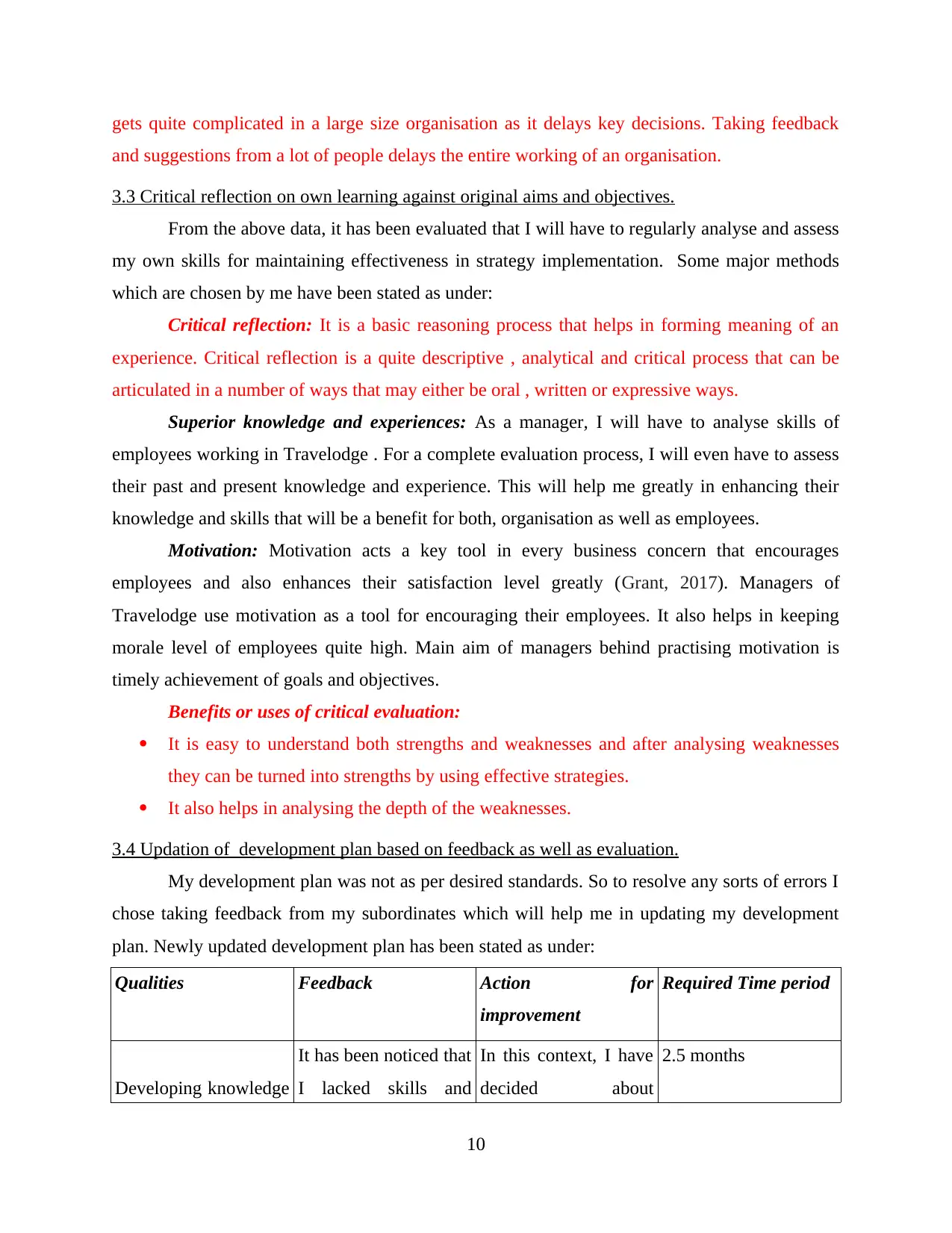
gets quite complicated in a large size organisation as it delays key decisions. Taking feedback
and suggestions from a lot of people delays the entire working of an organisation.
3.3 Critical reflection on own learning against original aims and objectives.
From the above data, it has been evaluated that I will have to regularly analyse and assess
my own skills for maintaining effectiveness in strategy implementation. Some major methods
which are chosen by me have been stated as under:
Critical reflection: It is a basic reasoning process that helps in forming meaning of an
experience. Critical reflection is a quite descriptive , analytical and critical process that can be
articulated in a number of ways that may either be oral , written or expressive ways.
Superior knowledge and experiences: As a manager, I will have to analyse skills of
employees working in Travelodge . For a complete evaluation process, I will even have to assess
their past and present knowledge and experience. This will help me greatly in enhancing their
knowledge and skills that will be a benefit for both, organisation as well as employees.
Motivation: Motivation acts a key tool in every business concern that encourages
employees and also enhances their satisfaction level greatly (Grant, 2017). Managers of
Travelodge use motivation as a tool for encouraging their employees. It also helps in keeping
morale level of employees quite high. Main aim of managers behind practising motivation is
timely achievement of goals and objectives.
Benefits or uses of critical evaluation:
It is easy to understand both strengths and weaknesses and after analysing weaknesses
they can be turned into strengths by using effective strategies.
It also helps in analysing the depth of the weaknesses.
3.4 Updation of development plan based on feedback as well as evaluation.
My development plan was not as per desired standards. So to resolve any sorts of errors I
chose taking feedback from my subordinates which will help me in updating my development
plan. Newly updated development plan has been stated as under:
Qualities Feedback Action for
improvement
Required Time period
Developing knowledge
It has been noticed that
I lacked skills and
In this context, I have
decided about
2.5 months
10
and suggestions from a lot of people delays the entire working of an organisation.
3.3 Critical reflection on own learning against original aims and objectives.
From the above data, it has been evaluated that I will have to regularly analyse and assess
my own skills for maintaining effectiveness in strategy implementation. Some major methods
which are chosen by me have been stated as under:
Critical reflection: It is a basic reasoning process that helps in forming meaning of an
experience. Critical reflection is a quite descriptive , analytical and critical process that can be
articulated in a number of ways that may either be oral , written or expressive ways.
Superior knowledge and experiences: As a manager, I will have to analyse skills of
employees working in Travelodge . For a complete evaluation process, I will even have to assess
their past and present knowledge and experience. This will help me greatly in enhancing their
knowledge and skills that will be a benefit for both, organisation as well as employees.
Motivation: Motivation acts a key tool in every business concern that encourages
employees and also enhances their satisfaction level greatly (Grant, 2017). Managers of
Travelodge use motivation as a tool for encouraging their employees. It also helps in keeping
morale level of employees quite high. Main aim of managers behind practising motivation is
timely achievement of goals and objectives.
Benefits or uses of critical evaluation:
It is easy to understand both strengths and weaknesses and after analysing weaknesses
they can be turned into strengths by using effective strategies.
It also helps in analysing the depth of the weaknesses.
3.4 Updation of development plan based on feedback as well as evaluation.
My development plan was not as per desired standards. So to resolve any sorts of errors I
chose taking feedback from my subordinates which will help me in updating my development
plan. Newly updated development plan has been stated as under:
Qualities Feedback Action for
improvement
Required Time period
Developing knowledge
It has been noticed that
I lacked skills and
In this context, I have
decided about
2.5 months
10
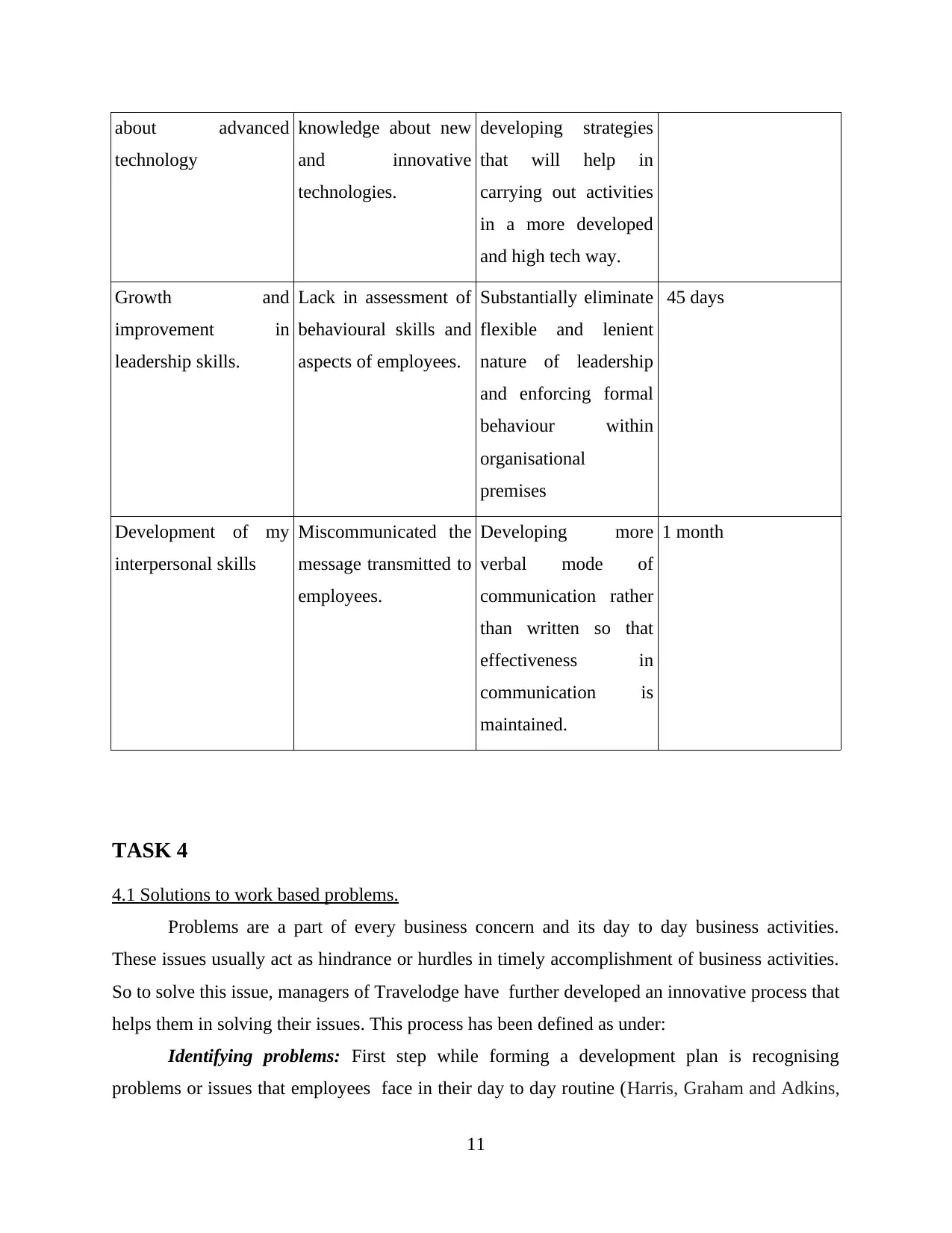
about advanced
technology
knowledge about new
and innovative
technologies.
developing strategies
that will help in
carrying out activities
in a more developed
and high tech way.
Growth and
improvement in
leadership skills.
Lack in assessment of
behavioural skills and
aspects of employees.
Substantially eliminate
flexible and lenient
nature of leadership
and enforcing formal
behaviour within
organisational
premises
45 days
Development of my
interpersonal skills
Miscommunicated the
message transmitted to
employees.
Developing more
verbal mode of
communication rather
than written so that
effectiveness in
communication is
maintained.
1 month
TASK 4
4.1 Solutions to work based problems.
Problems are a part of every business concern and its day to day business activities.
These issues usually act as hindrance or hurdles in timely accomplishment of business activities.
So to solve this issue, managers of Travelodge have further developed an innovative process that
helps them in solving their issues. This process has been defined as under:
Identifying problems: First step while forming a development plan is recognising
problems or issues that employees face in their day to day routine (Harris, Graham and Adkins,
11
technology
knowledge about new
and innovative
technologies.
developing strategies
that will help in
carrying out activities
in a more developed
and high tech way.
Growth and
improvement in
leadership skills.
Lack in assessment of
behavioural skills and
aspects of employees.
Substantially eliminate
flexible and lenient
nature of leadership
and enforcing formal
behaviour within
organisational
premises
45 days
Development of my
interpersonal skills
Miscommunicated the
message transmitted to
employees.
Developing more
verbal mode of
communication rather
than written so that
effectiveness in
communication is
maintained.
1 month
TASK 4
4.1 Solutions to work based problems.
Problems are a part of every business concern and its day to day business activities.
These issues usually act as hindrance or hurdles in timely accomplishment of business activities.
So to solve this issue, managers of Travelodge have further developed an innovative process that
helps them in solving their issues. This process has been defined as under:
Identifying problems: First step while forming a development plan is recognising
problems or issues that employees face in their day to day routine (Harris, Graham and Adkins,
11
Paraphrase This Document
Need a fresh take? Get an instant paraphrase of this document with our AI Paraphraser
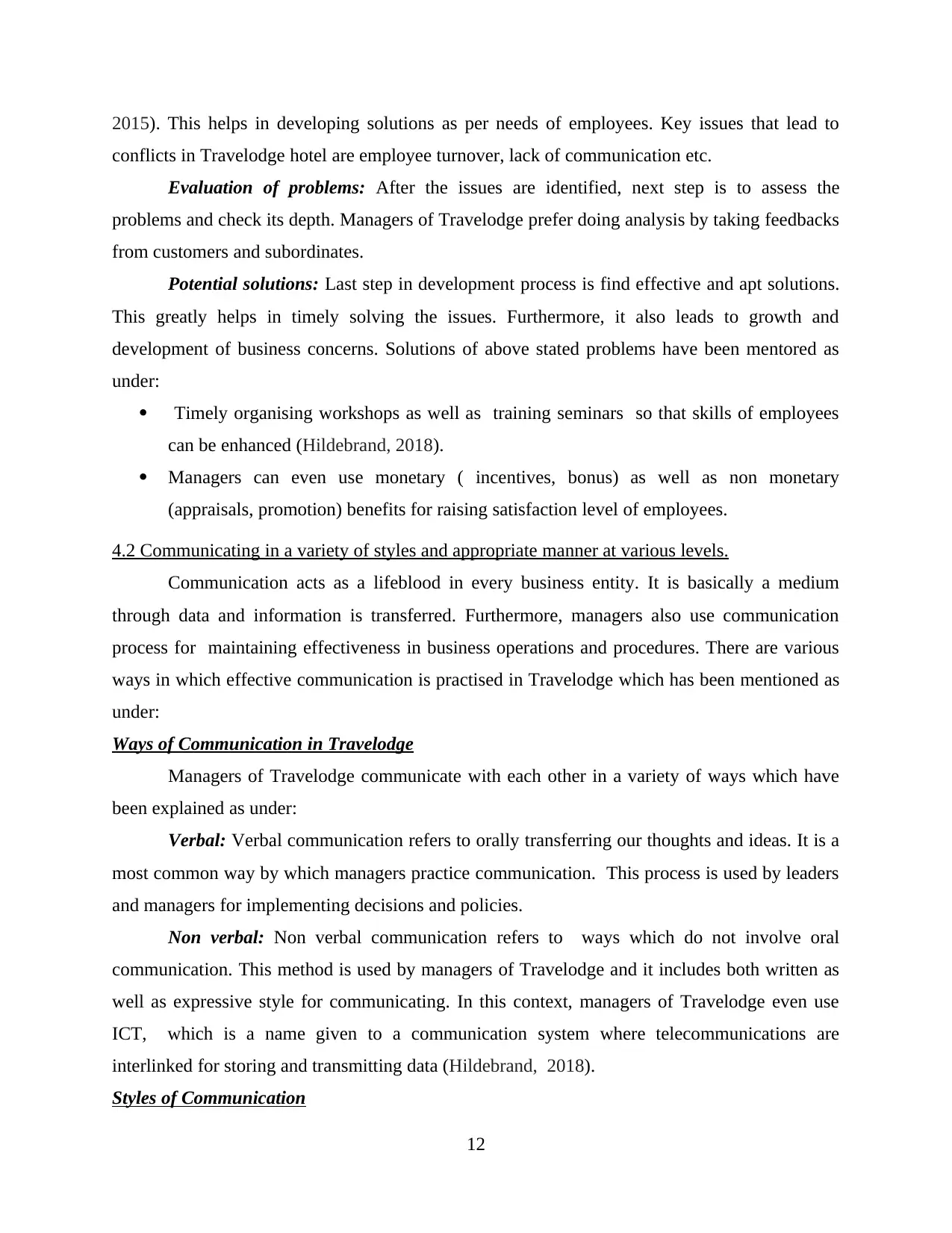
2015). This helps in developing solutions as per needs of employees. Key issues that lead to
conflicts in Travelodge hotel are employee turnover, lack of communication etc.
Evaluation of problems: After the issues are identified, next step is to assess the
problems and check its depth. Managers of Travelodge prefer doing analysis by taking feedbacks
from customers and subordinates.
Potential solutions: Last step in development process is find effective and apt solutions.
This greatly helps in timely solving the issues. Furthermore, it also leads to growth and
development of business concerns. Solutions of above stated problems have been mentored as
under:
Timely organising workshops as well as training seminars so that skills of employees
can be enhanced (Hildebrand, 2018).
Managers can even use monetary ( incentives, bonus) as well as non monetary
(appraisals, promotion) benefits for raising satisfaction level of employees.
4.2 Communicating in a variety of styles and appropriate manner at various levels.
Communication acts as a lifeblood in every business entity. It is basically a medium
through data and information is transferred. Furthermore, managers also use communication
process for maintaining effectiveness in business operations and procedures. There are various
ways in which effective communication is practised in Travelodge which has been mentioned as
under:
Ways of Communication in Travelodge
Managers of Travelodge communicate with each other in a variety of ways which have
been explained as under:
Verbal: Verbal communication refers to orally transferring our thoughts and ideas. It is a
most common way by which managers practice communication. This process is used by leaders
and managers for implementing decisions and policies.
Non verbal: Non verbal communication refers to ways which do not involve oral
communication. This method is used by managers of Travelodge and it includes both written as
well as expressive style for communicating. In this context, managers of Travelodge even use
ICT, which is a name given to a communication system where telecommunications are
interlinked for storing and transmitting data (Hildebrand, 2018).
Styles of Communication
12
conflicts in Travelodge hotel are employee turnover, lack of communication etc.
Evaluation of problems: After the issues are identified, next step is to assess the
problems and check its depth. Managers of Travelodge prefer doing analysis by taking feedbacks
from customers and subordinates.
Potential solutions: Last step in development process is find effective and apt solutions.
This greatly helps in timely solving the issues. Furthermore, it also leads to growth and
development of business concerns. Solutions of above stated problems have been mentored as
under:
Timely organising workshops as well as training seminars so that skills of employees
can be enhanced (Hildebrand, 2018).
Managers can even use monetary ( incentives, bonus) as well as non monetary
(appraisals, promotion) benefits for raising satisfaction level of employees.
4.2 Communicating in a variety of styles and appropriate manner at various levels.
Communication acts as a lifeblood in every business entity. It is basically a medium
through data and information is transferred. Furthermore, managers also use communication
process for maintaining effectiveness in business operations and procedures. There are various
ways in which effective communication is practised in Travelodge which has been mentioned as
under:
Ways of Communication in Travelodge
Managers of Travelodge communicate with each other in a variety of ways which have
been explained as under:
Verbal: Verbal communication refers to orally transferring our thoughts and ideas. It is a
most common way by which managers practice communication. This process is used by leaders
and managers for implementing decisions and policies.
Non verbal: Non verbal communication refers to ways which do not involve oral
communication. This method is used by managers of Travelodge and it includes both written as
well as expressive style for communicating. In this context, managers of Travelodge even use
ICT, which is a name given to a communication system where telecommunications are
interlinked for storing and transmitting data (Hildebrand, 2018).
Styles of Communication
12
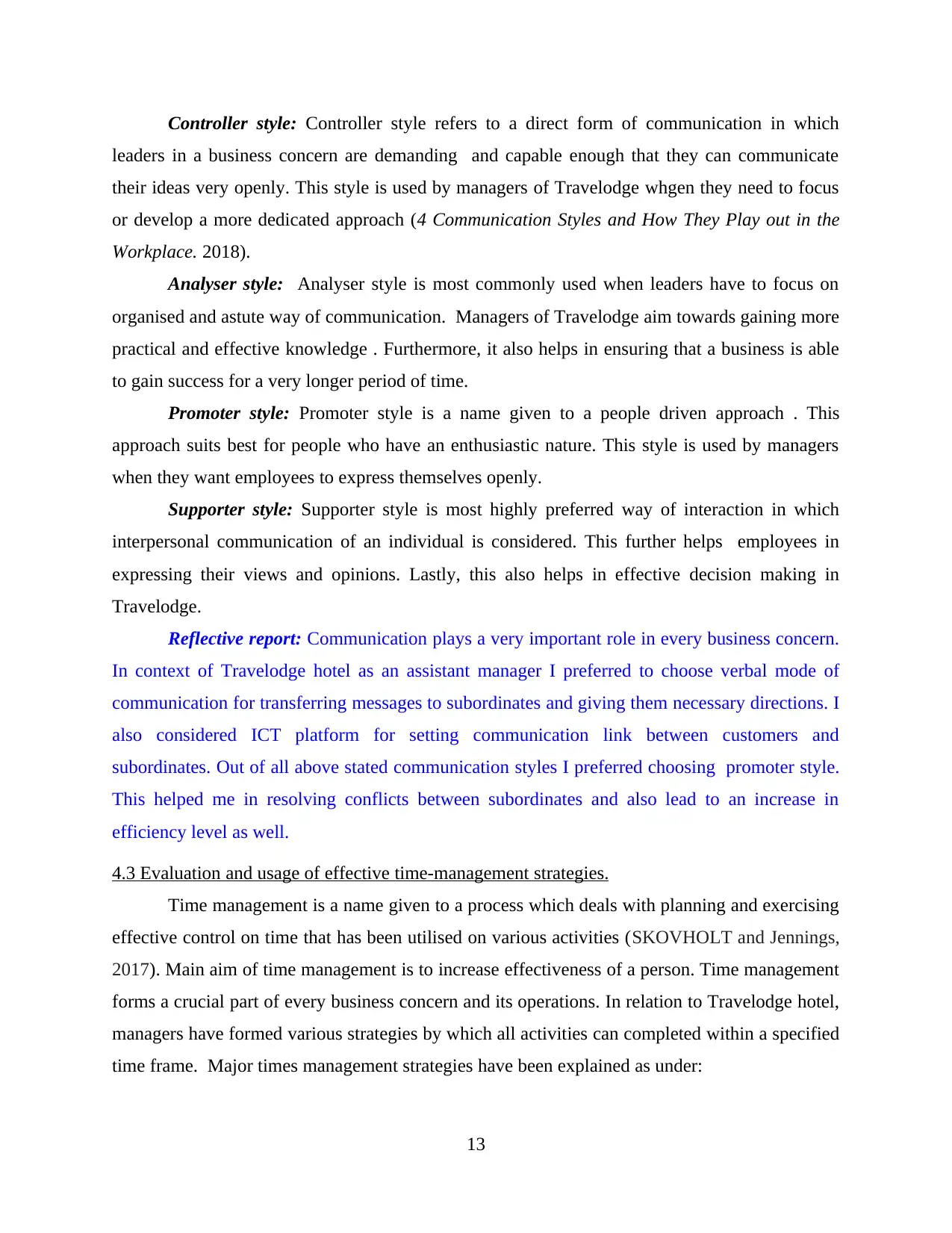
Controller style: Controller style refers to a direct form of communication in which
leaders in a business concern are demanding and capable enough that they can communicate
their ideas very openly. This style is used by managers of Travelodge whgen they need to focus
or develop a more dedicated approach (4 Communication Styles and How They Play out in the
Workplace. 2018).
Analyser style: Analyser style is most commonly used when leaders have to focus on
organised and astute way of communication. Managers of Travelodge aim towards gaining more
practical and effective knowledge . Furthermore, it also helps in ensuring that a business is able
to gain success for a very longer period of time.
Promoter style: Promoter style is a name given to a people driven approach . This
approach suits best for people who have an enthusiastic nature. This style is used by managers
when they want employees to express themselves openly.
Supporter style: Supporter style is most highly preferred way of interaction in which
interpersonal communication of an individual is considered. This further helps employees in
expressing their views and opinions. Lastly, this also helps in effective decision making in
Travelodge.
Reflective report: Communication plays a very important role in every business concern.
In context of Travelodge hotel as an assistant manager I preferred to choose verbal mode of
communication for transferring messages to subordinates and giving them necessary directions. I
also considered ICT platform for setting communication link between customers and
subordinates. Out of all above stated communication styles I preferred choosing promoter style.
This helped me in resolving conflicts between subordinates and also lead to an increase in
efficiency level as well.
4.3 Evaluation and usage of effective time-management strategies.
Time management is a name given to a process which deals with planning and exercising
effective control on time that has been utilised on various activities (SKOVHOLT and Jennings,
2017). Main aim of time management is to increase effectiveness of a person. Time management
forms a crucial part of every business concern and its operations. In relation to Travelodge hotel,
managers have formed various strategies by which all activities can completed within a specified
time frame. Major times management strategies have been explained as under:
13
leaders in a business concern are demanding and capable enough that they can communicate
their ideas very openly. This style is used by managers of Travelodge whgen they need to focus
or develop a more dedicated approach (4 Communication Styles and How They Play out in the
Workplace. 2018).
Analyser style: Analyser style is most commonly used when leaders have to focus on
organised and astute way of communication. Managers of Travelodge aim towards gaining more
practical and effective knowledge . Furthermore, it also helps in ensuring that a business is able
to gain success for a very longer period of time.
Promoter style: Promoter style is a name given to a people driven approach . This
approach suits best for people who have an enthusiastic nature. This style is used by managers
when they want employees to express themselves openly.
Supporter style: Supporter style is most highly preferred way of interaction in which
interpersonal communication of an individual is considered. This further helps employees in
expressing their views and opinions. Lastly, this also helps in effective decision making in
Travelodge.
Reflective report: Communication plays a very important role in every business concern.
In context of Travelodge hotel as an assistant manager I preferred to choose verbal mode of
communication for transferring messages to subordinates and giving them necessary directions. I
also considered ICT platform for setting communication link between customers and
subordinates. Out of all above stated communication styles I preferred choosing promoter style.
This helped me in resolving conflicts between subordinates and also lead to an increase in
efficiency level as well.
4.3 Evaluation and usage of effective time-management strategies.
Time management is a name given to a process which deals with planning and exercising
effective control on time that has been utilised on various activities (SKOVHOLT and Jennings,
2017). Main aim of time management is to increase effectiveness of a person. Time management
forms a crucial part of every business concern and its operations. In relation to Travelodge hotel,
managers have formed various strategies by which all activities can completed within a specified
time frame. Major times management strategies have been explained as under:
13
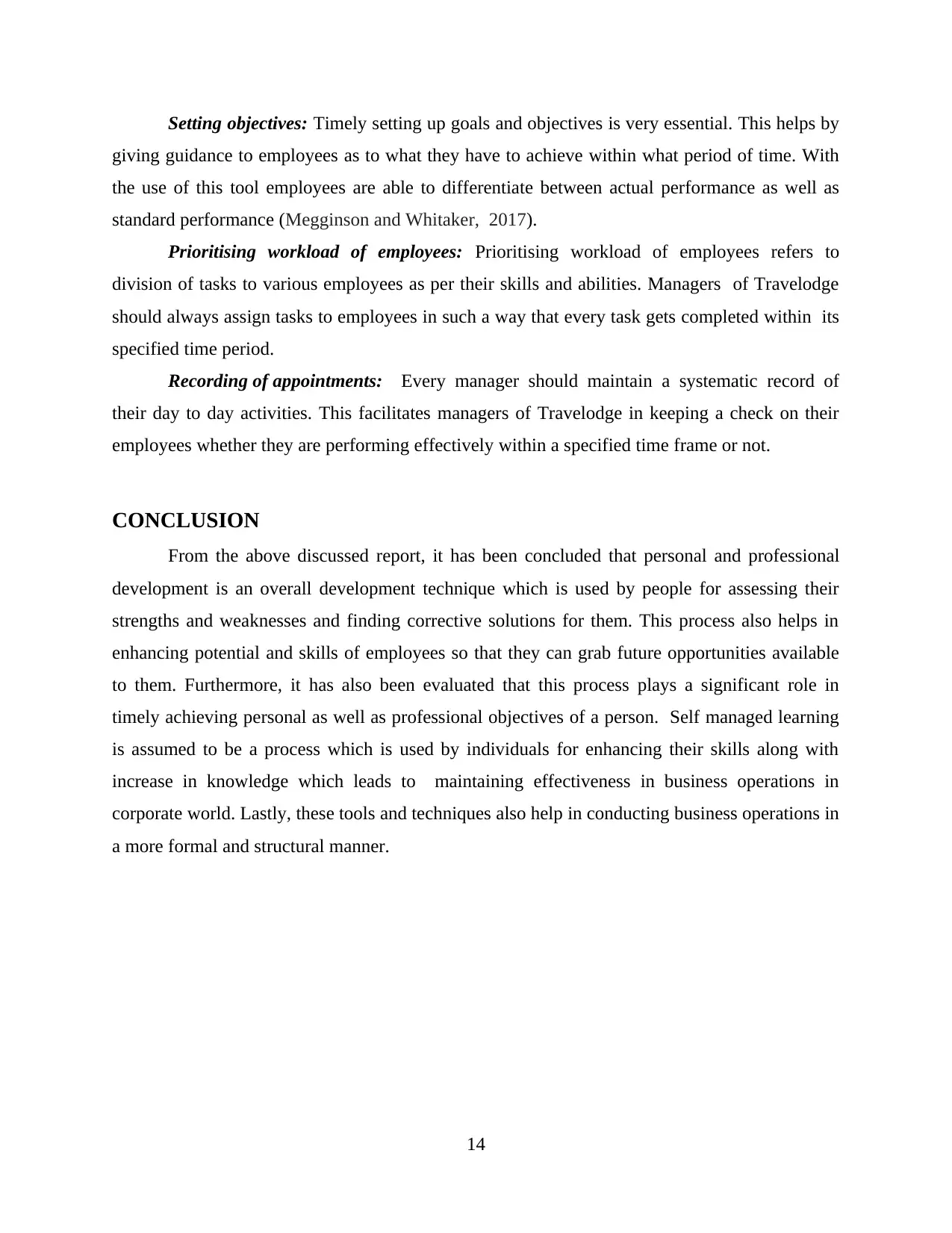
Setting objectives: Timely setting up goals and objectives is very essential. This helps by
giving guidance to employees as to what they have to achieve within what period of time. With
the use of this tool employees are able to differentiate between actual performance as well as
standard performance (Megginson and Whitaker, 2017).
Prioritising workload of employees: Prioritising workload of employees refers to
division of tasks to various employees as per their skills and abilities. Managers of Travelodge
should always assign tasks to employees in such a way that every task gets completed within its
specified time period.
Recording of appointments: Every manager should maintain a systematic record of
their day to day activities. This facilitates managers of Travelodge in keeping a check on their
employees whether they are performing effectively within a specified time frame or not.
CONCLUSION
From the above discussed report, it has been concluded that personal and professional
development is an overall development technique which is used by people for assessing their
strengths and weaknesses and finding corrective solutions for them. This process also helps in
enhancing potential and skills of employees so that they can grab future opportunities available
to them. Furthermore, it has also been evaluated that this process plays a significant role in
timely achieving personal as well as professional objectives of a person. Self managed learning
is assumed to be a process which is used by individuals for enhancing their skills along with
increase in knowledge which leads to maintaining effectiveness in business operations in
corporate world. Lastly, these tools and techniques also help in conducting business operations in
a more formal and structural manner.
14
giving guidance to employees as to what they have to achieve within what period of time. With
the use of this tool employees are able to differentiate between actual performance as well as
standard performance (Megginson and Whitaker, 2017).
Prioritising workload of employees: Prioritising workload of employees refers to
division of tasks to various employees as per their skills and abilities. Managers of Travelodge
should always assign tasks to employees in such a way that every task gets completed within its
specified time period.
Recording of appointments: Every manager should maintain a systematic record of
their day to day activities. This facilitates managers of Travelodge in keeping a check on their
employees whether they are performing effectively within a specified time frame or not.
CONCLUSION
From the above discussed report, it has been concluded that personal and professional
development is an overall development technique which is used by people for assessing their
strengths and weaknesses and finding corrective solutions for them. This process also helps in
enhancing potential and skills of employees so that they can grab future opportunities available
to them. Furthermore, it has also been evaluated that this process plays a significant role in
timely achieving personal as well as professional objectives of a person. Self managed learning
is assumed to be a process which is used by individuals for enhancing their skills along with
increase in knowledge which leads to maintaining effectiveness in business operations in
corporate world. Lastly, these tools and techniques also help in conducting business operations in
a more formal and structural manner.
14
Secure Best Marks with AI Grader
Need help grading? Try our AI Grader for instant feedback on your assignments.

15
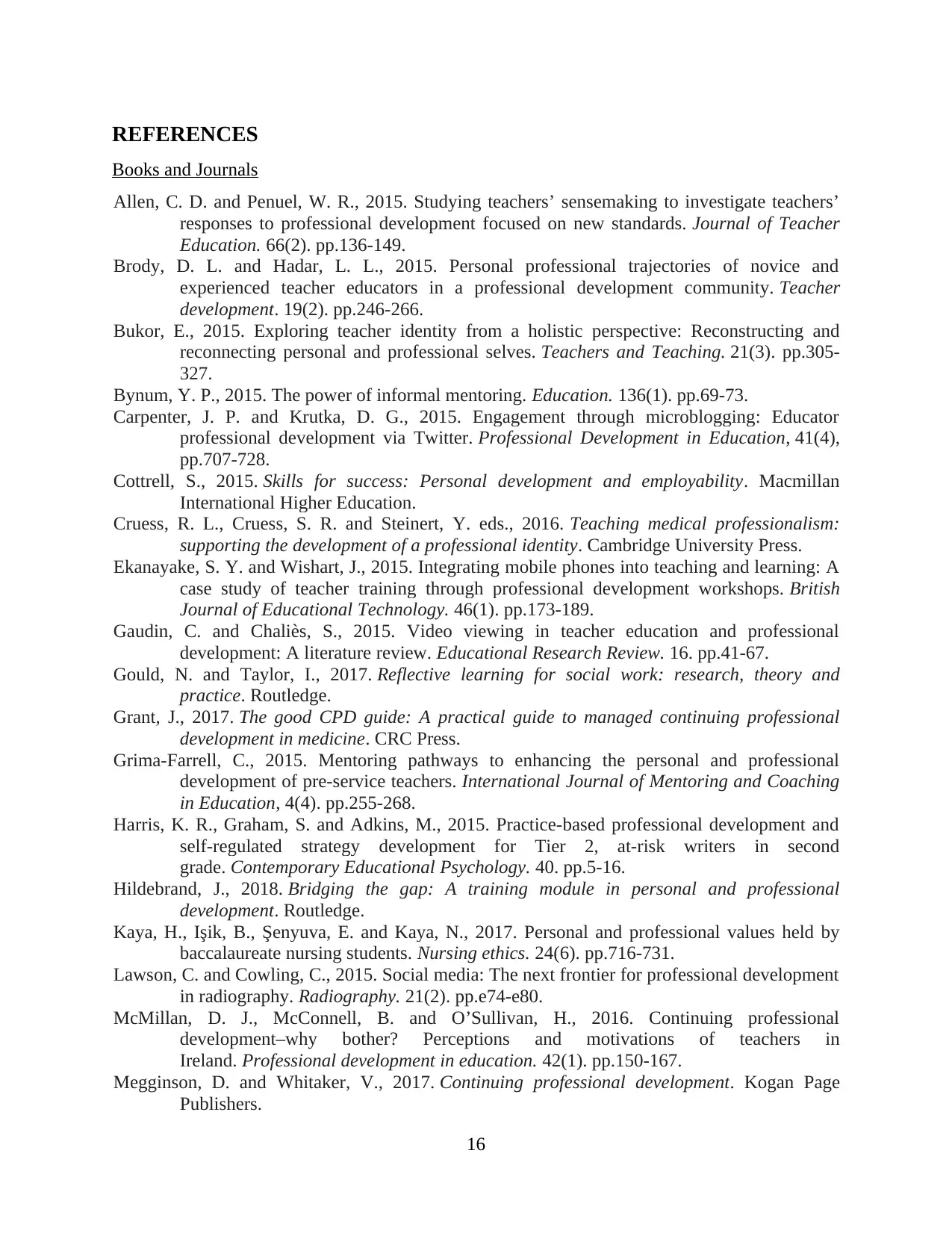
REFERENCES
Books and Journals
Allen, C. D. and Penuel, W. R., 2015. Studying teachers’ sensemaking to investigate teachers’
responses to professional development focused on new standards. Journal of Teacher
Education. 66(2). pp.136-149.
Brody, D. L. and Hadar, L. L., 2015. Personal professional trajectories of novice and
experienced teacher educators in a professional development community. Teacher
development. 19(2). pp.246-266.
Bukor, E., 2015. Exploring teacher identity from a holistic perspective: Reconstructing and
reconnecting personal and professional selves. Teachers and Teaching. 21(3). pp.305-
327.
Bynum, Y. P., 2015. The power of informal mentoring. Education. 136(1). pp.69-73.
Carpenter, J. P. and Krutka, D. G., 2015. Engagement through microblogging: Educator
professional development via Twitter. Professional Development in Education, 41(4),
pp.707-728.
Cottrell, S., 2015. Skills for success: Personal development and employability. Macmillan
International Higher Education.
Cruess, R. L., Cruess, S. R. and Steinert, Y. eds., 2016. Teaching medical professionalism:
supporting the development of a professional identity. Cambridge University Press.
Ekanayake, S. Y. and Wishart, J., 2015. Integrating mobile phones into teaching and learning: A
case study of teacher training through professional development workshops. British
Journal of Educational Technology. 46(1). pp.173-189.
Gaudin, C. and Chaliès, S., 2015. Video viewing in teacher education and professional
development: A literature review. Educational Research Review. 16. pp.41-67.
Gould, N. and Taylor, I., 2017. Reflective learning for social work: research, theory and
practice. Routledge.
Grant, J., 2017. The good CPD guide: A practical guide to managed continuing professional
development in medicine. CRC Press.
Grima-Farrell, C., 2015. Mentoring pathways to enhancing the personal and professional
development of pre-service teachers. International Journal of Mentoring and Coaching
in Education, 4(4). pp.255-268.
Harris, K. R., Graham, S. and Adkins, M., 2015. Practice-based professional development and
self-regulated strategy development for Tier 2, at-risk writers in second
grade. Contemporary Educational Psychology. 40. pp.5-16.
Hildebrand, J., 2018. Bridging the gap: A training module in personal and professional
development. Routledge.
Kaya, H., Işik, B., Şenyuva, E. and Kaya, N., 2017. Personal and professional values held by
baccalaureate nursing students. Nursing ethics. 24(6). pp.716-731.
Lawson, C. and Cowling, C., 2015. Social media: The next frontier for professional development
in radiography. Radiography. 21(2). pp.e74-e80.
McMillan, D. J., McConnell, B. and O’Sullivan, H., 2016. Continuing professional
development–why bother? Perceptions and motivations of teachers in
Ireland. Professional development in education. 42(1). pp.150-167.
Megginson, D. and Whitaker, V., 2017. Continuing professional development. Kogan Page
Publishers.
16
Books and Journals
Allen, C. D. and Penuel, W. R., 2015. Studying teachers’ sensemaking to investigate teachers’
responses to professional development focused on new standards. Journal of Teacher
Education. 66(2). pp.136-149.
Brody, D. L. and Hadar, L. L., 2015. Personal professional trajectories of novice and
experienced teacher educators in a professional development community. Teacher
development. 19(2). pp.246-266.
Bukor, E., 2015. Exploring teacher identity from a holistic perspective: Reconstructing and
reconnecting personal and professional selves. Teachers and Teaching. 21(3). pp.305-
327.
Bynum, Y. P., 2015. The power of informal mentoring. Education. 136(1). pp.69-73.
Carpenter, J. P. and Krutka, D. G., 2015. Engagement through microblogging: Educator
professional development via Twitter. Professional Development in Education, 41(4),
pp.707-728.
Cottrell, S., 2015. Skills for success: Personal development and employability. Macmillan
International Higher Education.
Cruess, R. L., Cruess, S. R. and Steinert, Y. eds., 2016. Teaching medical professionalism:
supporting the development of a professional identity. Cambridge University Press.
Ekanayake, S. Y. and Wishart, J., 2015. Integrating mobile phones into teaching and learning: A
case study of teacher training through professional development workshops. British
Journal of Educational Technology. 46(1). pp.173-189.
Gaudin, C. and Chaliès, S., 2015. Video viewing in teacher education and professional
development: A literature review. Educational Research Review. 16. pp.41-67.
Gould, N. and Taylor, I., 2017. Reflective learning for social work: research, theory and
practice. Routledge.
Grant, J., 2017. The good CPD guide: A practical guide to managed continuing professional
development in medicine. CRC Press.
Grima-Farrell, C., 2015. Mentoring pathways to enhancing the personal and professional
development of pre-service teachers. International Journal of Mentoring and Coaching
in Education, 4(4). pp.255-268.
Harris, K. R., Graham, S. and Adkins, M., 2015. Practice-based professional development and
self-regulated strategy development for Tier 2, at-risk writers in second
grade. Contemporary Educational Psychology. 40. pp.5-16.
Hildebrand, J., 2018. Bridging the gap: A training module in personal and professional
development. Routledge.
Kaya, H., Işik, B., Şenyuva, E. and Kaya, N., 2017. Personal and professional values held by
baccalaureate nursing students. Nursing ethics. 24(6). pp.716-731.
Lawson, C. and Cowling, C., 2015. Social media: The next frontier for professional development
in radiography. Radiography. 21(2). pp.e74-e80.
McMillan, D. J., McConnell, B. and O’Sullivan, H., 2016. Continuing professional
development–why bother? Perceptions and motivations of teachers in
Ireland. Professional development in education. 42(1). pp.150-167.
Megginson, D. and Whitaker, V., 2017. Continuing professional development. Kogan Page
Publishers.
16
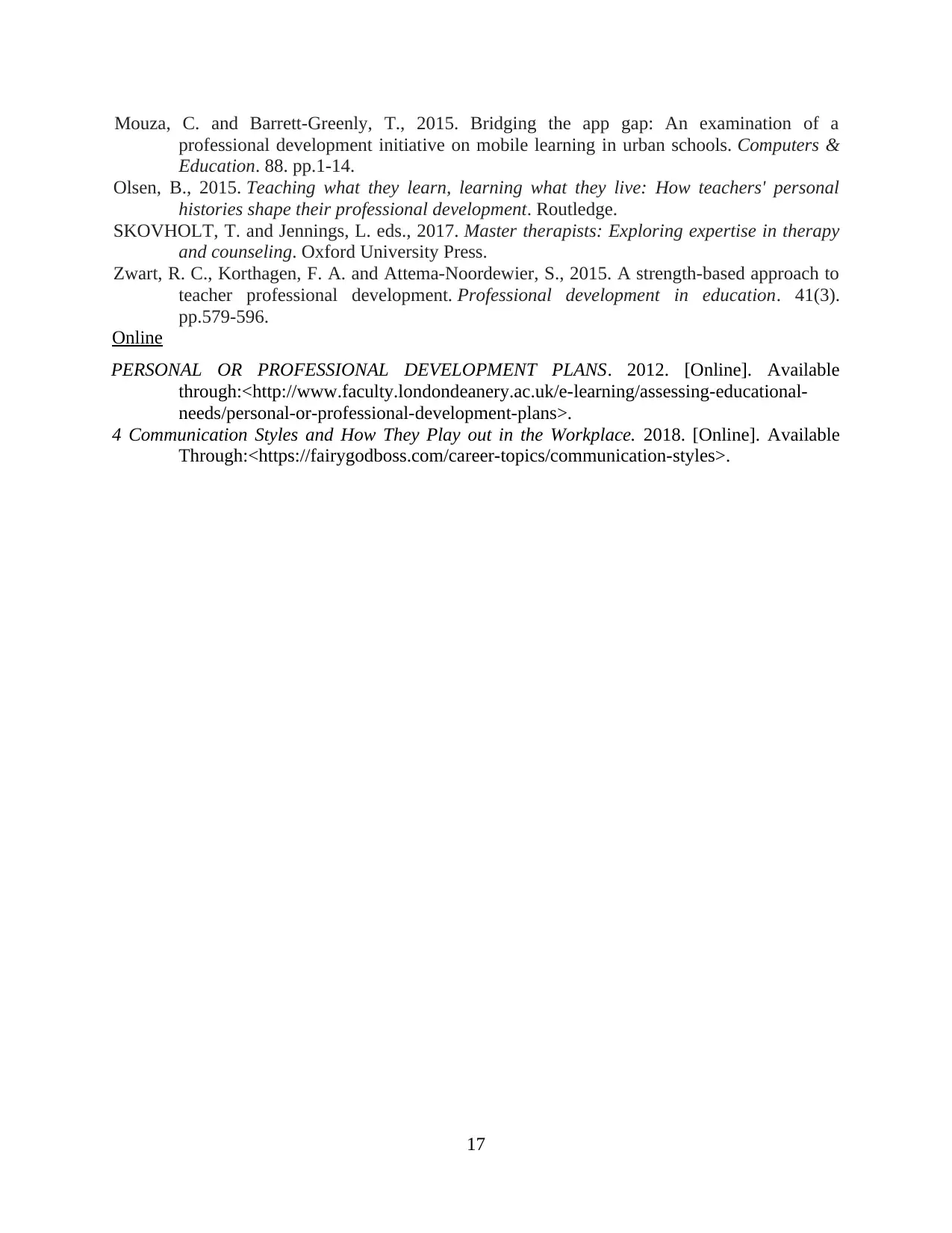
Mouza, C. and Barrett-Greenly, T., 2015. Bridging the app gap: An examination of a
professional development initiative on mobile learning in urban schools. Computers &
Education. 88. pp.1-14.
Olsen, B., 2015. Teaching what they learn, learning what they live: How teachers' personal
histories shape their professional development. Routledge.
SKOVHOLT, T. and Jennings, L. eds., 2017. Master therapists: Exploring expertise in therapy
and counseling. Oxford University Press.
Zwart, R. C., Korthagen, F. A. and Attema-Noordewier, S., 2015. A strength-based approach to
teacher professional development. Professional development in education. 41(3).
pp.579-596.
Online
PERSONAL OR PROFESSIONAL DEVELOPMENT PLANS. 2012. [Online]. Available
through:<http://www.faculty.londondeanery.ac.uk/e-learning/assessing-educational-
needs/personal-or-professional-development-plans>.
4 Communication Styles and How They Play out in the Workplace. 2018. [Online]. Available
Through:<https://fairygodboss.com/career-topics/communication-styles>.
17
professional development initiative on mobile learning in urban schools. Computers &
Education. 88. pp.1-14.
Olsen, B., 2015. Teaching what they learn, learning what they live: How teachers' personal
histories shape their professional development. Routledge.
SKOVHOLT, T. and Jennings, L. eds., 2017. Master therapists: Exploring expertise in therapy
and counseling. Oxford University Press.
Zwart, R. C., Korthagen, F. A. and Attema-Noordewier, S., 2015. A strength-based approach to
teacher professional development. Professional development in education. 41(3).
pp.579-596.
Online
PERSONAL OR PROFESSIONAL DEVELOPMENT PLANS. 2012. [Online]. Available
through:<http://www.faculty.londondeanery.ac.uk/e-learning/assessing-educational-
needs/personal-or-professional-development-plans>.
4 Communication Styles and How They Play out in the Workplace. 2018. [Online]. Available
Through:<https://fairygodboss.com/career-topics/communication-styles>.
17
Paraphrase This Document
Need a fresh take? Get an instant paraphrase of this document with our AI Paraphraser

18
1 out of 20
Related Documents
Your All-in-One AI-Powered Toolkit for Academic Success.
+13062052269
info@desklib.com
Available 24*7 on WhatsApp / Email
![[object Object]](/_next/static/media/star-bottom.7253800d.svg)
Unlock your academic potential
© 2024 | Zucol Services PVT LTD | All rights reserved.





